Kristine Hughes's Blog, page 73
July 10, 2015
THE DUKE OF WELLINGTON TOUR: WE INVADE WELLINGTON ARCH
Across the crazy traffic circle in front of Apsley House, the Wellington Arch stands in isolated magnificence. With some exceptions we will note further along.
To read what Victoria wrote about the history of the Wellington Arch last year, click here.
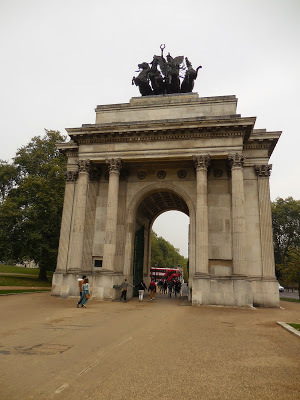 Looking through the arch toward Buckingham Palace
Looking through the arch toward Buckingham Palace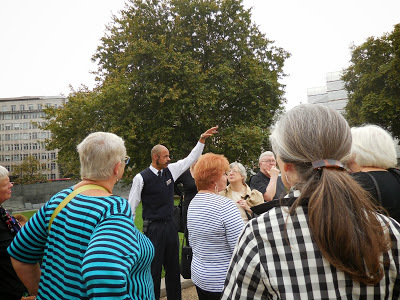 Our Guide Clive points out the Wellington statue nearby.
Our Guide Clive points out the Wellington statue nearby.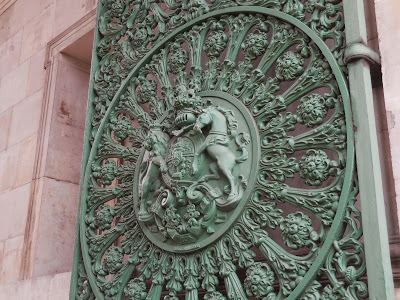 \The doors bear the royal crest.
\The doors bear the royal crest.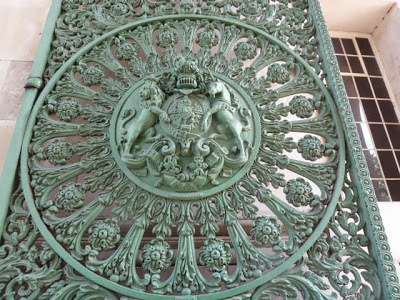 Decimus Burton, architect of the arch and the Hyde Park Screen across the street, also designed the iron doors, cast by Joseph Bramah & Sons of Pimlico. They are painted to resemble a bronze patina.
Decimus Burton, architect of the arch and the Hyde Park Screen across the street, also designed the iron doors, cast by Joseph Bramah & Sons of Pimlico. They are painted to resemble a bronze patina.For information on the exhibitions at the Arch, go their website, click here.
We elevated to the top of the arch for the daily parade of guards and were excited at the view. Took many many pictures!
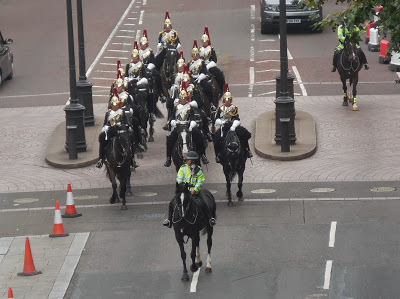
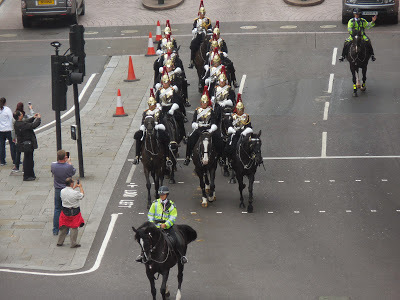
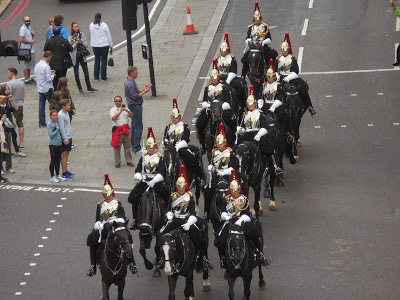
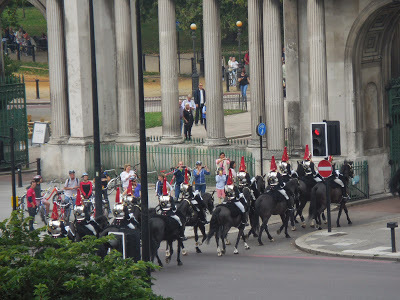
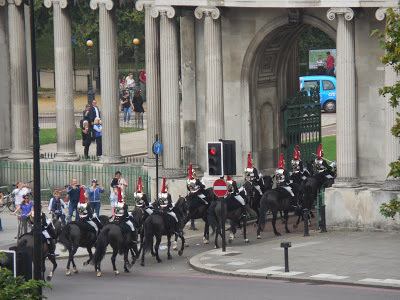 Through the screen and into the park beside Apsley House.
Through the screen and into the park beside Apsley House.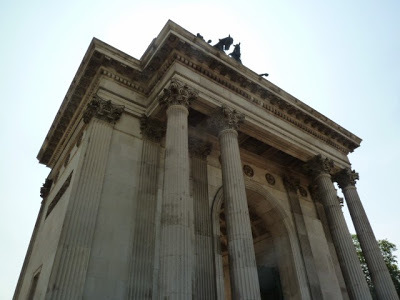
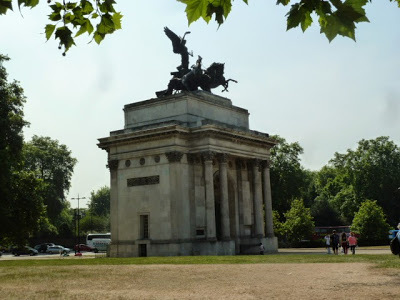
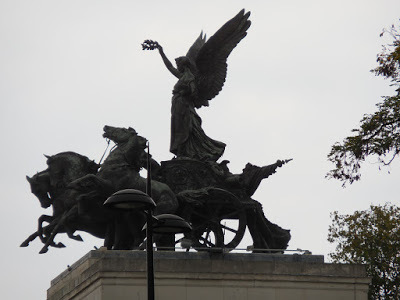
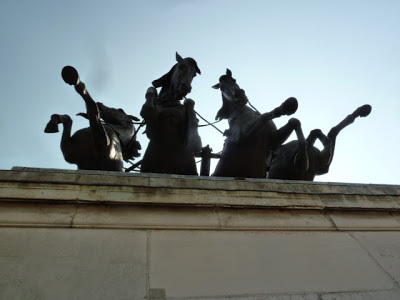 The Quadriga by Adrian Jones, finished 1912, replaced the monumental statue atop the Arch. The equestrian statue of the Duke had provoked considerable controversy, even ridicule, before it was dismantled and moved to its present location in Aldershot.
The Quadriga by Adrian Jones, finished 1912, replaced the monumental statue atop the Arch. The equestrian statue of the Duke had provoked considerable controversy, even ridicule, before it was dismantled and moved to its present location in Aldershot.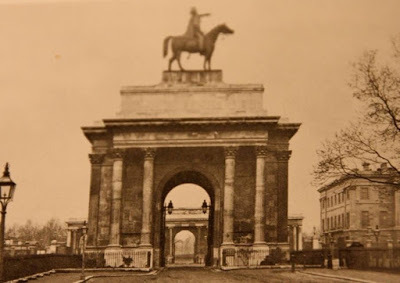 The monumental equestrian statue (8.5 metres high, aka 28 feet) overwhelmed the arch.
The monumental equestrian statue (8.5 metres high, aka 28 feet) overwhelmed the arch.Completed in 1846, the statue was cast from 40 tons of bronze, mostly from melted down French cannons, at a cost of £30,000. Though everyone was unhappy, it was raised on the arch, where it stood until the necessity for moving the location of the arch itself in the late 1880's.
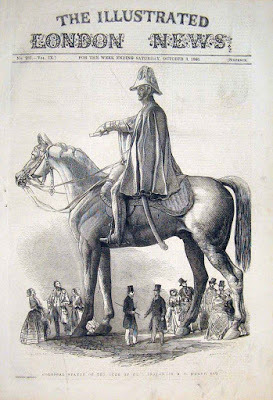 Gigantic size!
Gigantic size!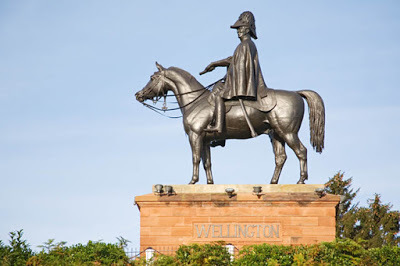 In its present position atop a hill in Aldershot, Hampshire, near the Military Museum, the statue has found a suitable home. The responsible artist was Matthew Coates Wyatt (1777-1862). It was restored in recent years.
In its present position atop a hill in Aldershot, Hampshire, near the Military Museum, the statue has found a suitable home. The responsible artist was Matthew Coates Wyatt (1777-1862). It was restored in recent years.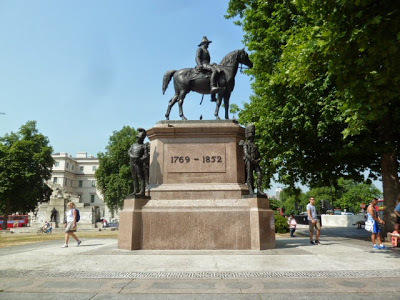 Today on the grounds of the Arch.
Today on the grounds of the Arch.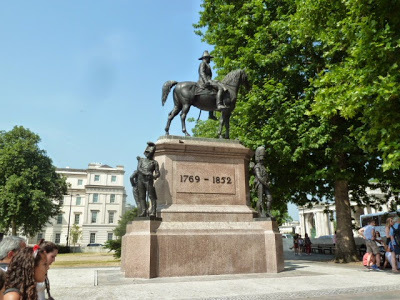
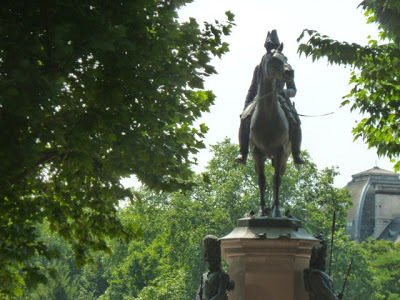
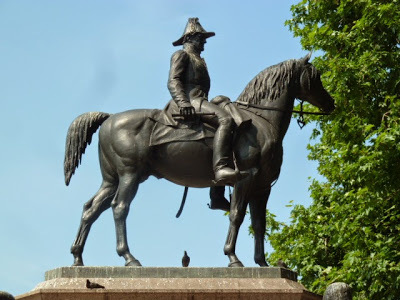 Wellington Statue near the Arch, by Joseph Boehm, 1888
Wellington Statue near the Arch, by Joseph Boehm, 1888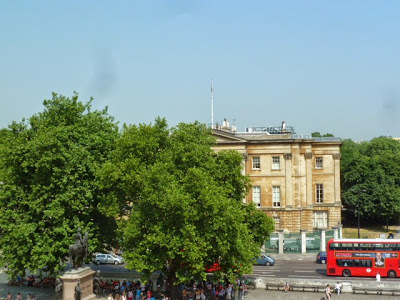
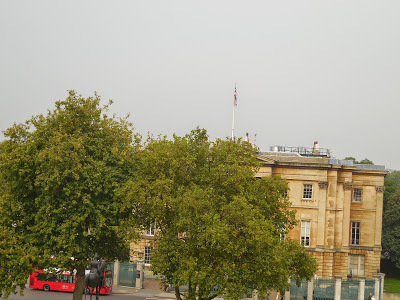 Apsley House from atop the Arch
Apsley House from atop the Arch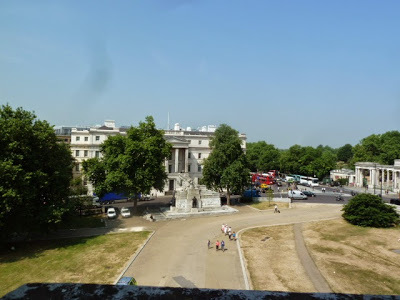
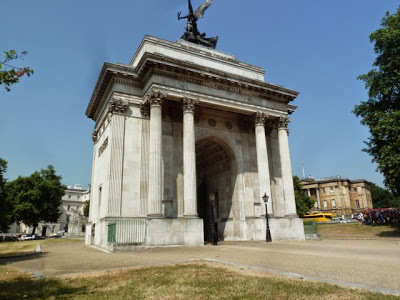
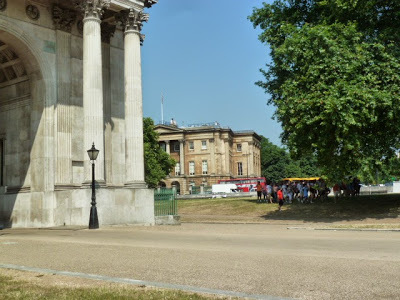
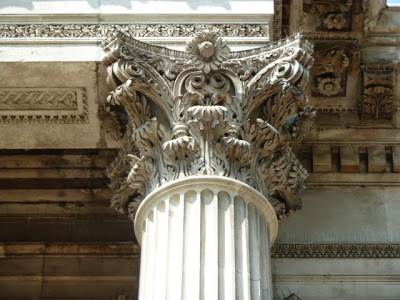 Close up of the capital of the Corinthian Columns
Close up of the capital of the Corinthian Columns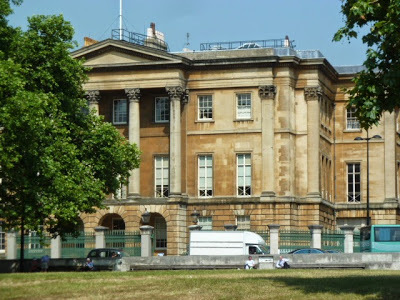
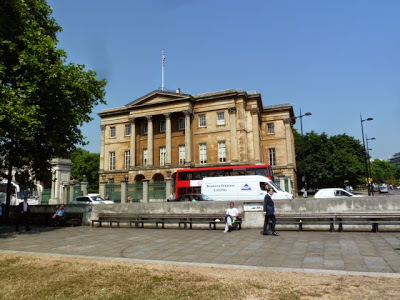
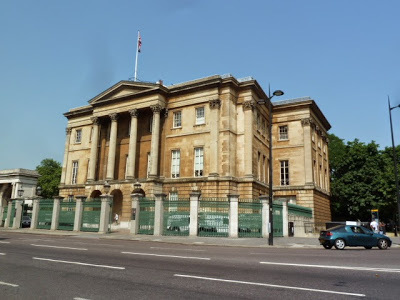 Apsley House from the traffic circle
Apsley House from the traffic circle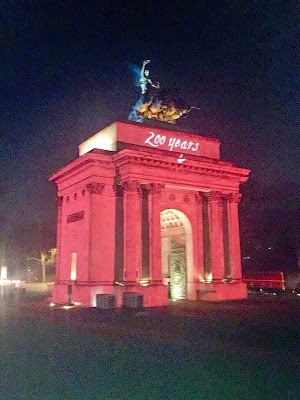
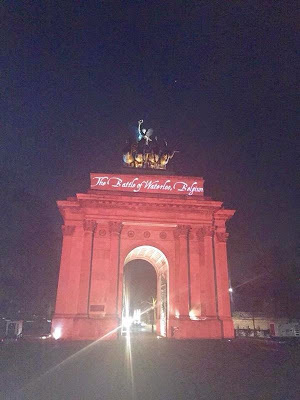
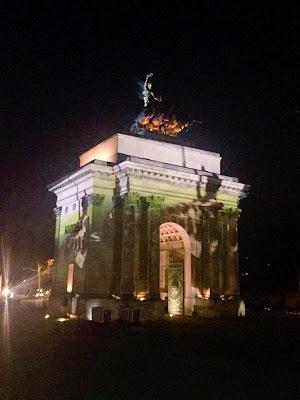
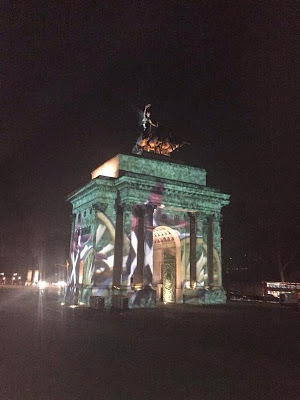 The Wellington Arch, illuminated during the celebration of the Battle of Waterloo Centenary, 2015
The Wellington Arch, illuminated during the celebration of the Battle of Waterloo Centenary, 2015After a fond farewell to the Wellington Arch and its nearby statue of the Duke of Wellington, our tour group proceeded to the bus and our drive across London to the Tower.
Published on July 10, 2015 00:30
July 8, 2015
WATERLOO'S AFTERMATH, PART TWO
DISPOSING OF NAPOLEON
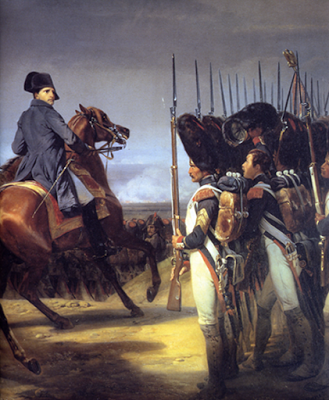 Napoleon and the Garde
Napoleon and the Garde
After the Battle on the 18th of June, Napoleon tried unsuccessfully to re-group. Unable to sort out the demoralized and scattered sildiers, he turned over command of his armies to General Soult and fled to Paris. The armies had about 150,000 troops stationed around France, including General Grouchy’s 60,000, who returned to Laon by June 26. Another 175,000 (?) conscripts were in training. There were also General Rapp’s Armee of the Rhine and General Lamarque’s Armee of La Vendee, still in place waiting for the Austrians and Russians. Napoleon wanted to continue the war, but he needed political and financial support.
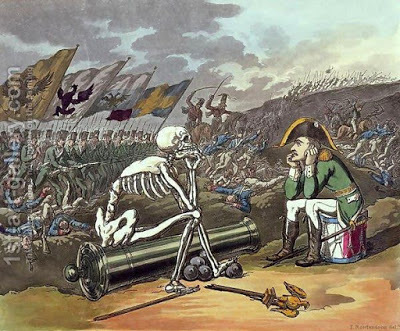 Rowlandson on Napoleon's Legacy
Rowlandson on Napoleon's Legacy
Napoleon was unsuccessful in getting the Chamber of Deputies -- or anybody else except his closest confidantes -- to agree to renew the war.
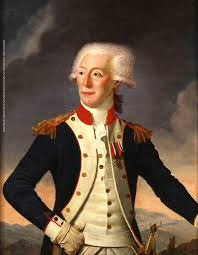 Marquis de Lafayette, 1790
Marquis de Lafayette, 1790
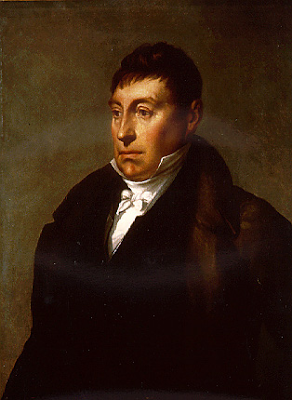 Lafayette, 1825
Lafayette, 1825
The hero of the American Revolution, the Marquis de Lafayette (1757-1834) spoke against Napoleon in the Chamber, in answer to pleas of the disgraced emperor by his brother Lucien Bonaparte. Lafayette said:“By what right do you dare accuse the nation of…want of perseverance in the emperor’s interest? The nation has followed him on the fields of Italy, across the sands of Egypt and the plains of Germany, across the frozen deserts of Russia. … The nation has followed him in fifty battles, in his defeats and his victories, and in doing so we have to mourn the blood of three million Frenchmen.”
Lafayette’s views prevailed and Napoleon was rejected. His attempted abdication in favor of his four-year-old son on June 22 (and by some reports, a failed suicide) was ignored by the Allies.
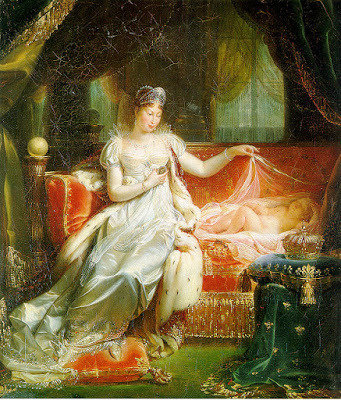 Marie Louise had fled to Austria with her son.
Marie Louise had fled to Austria with her son.
Fouché, president of the new provisional government, sent word Napoleon should leave Paris. Napoleon stayed for a few days at his late first wife’s chateau, Malmaison, just west of Paris. Here he and Josephine(who died in 1814) had enjoyed happiness and success. How he must have yearned for those days to return.
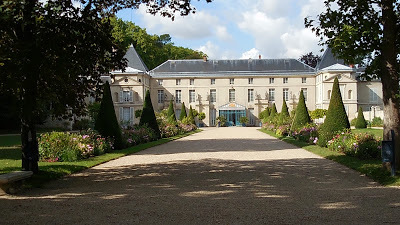 Malmaison, 2014
Malmaison, 2014
The Prussians were approaching by June 29, and he did not want to be captured. When he got word from the provisional government that he was not be issued any safe conduct by Blücher or Wellington, Napoleon decided to travel to the Atlantic coast and find a ship to take him to the United States, where he hoped to find refuge; he arrived in Rochefort on July 3. However, the British blockade, in effect again since his escape from Elba, made that impossible. Instead, he negotiated his surrender to Captain Frederick Maitland aboard the HMS Bellerophon on July 15.
An amusing aside: Upon boarding the HMS Bellerophon, Napoleon took over the cabin of the Captain and invited him and others to breakfast with him. Captain Humphrey Senhouse, captain of another ship in the fleet, later wrote to his wife: “I have just returned from dining with Napoleon Bonaparte. Can it be possible?”
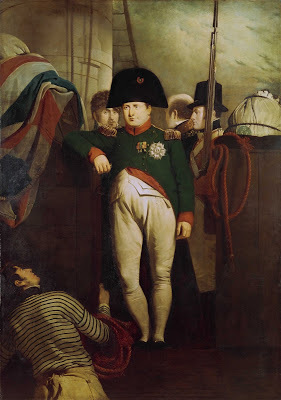 Napoleon Aboard the Bellerophon, by Sir Charles Lock Eastlake
Napoleon Aboard the Bellerophon, by Sir Charles Lock Eastlake
Napoleon appealed to the Prince Regent: “the most powerful, the most constant, and the most generous of my foes.” But the Government of Lord Liverpool was not inclined to make any allowances, and Prinny had enough troubles of his own.
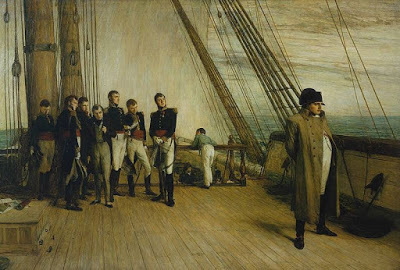 Napoleon Aboard the Bellerophon by Sir William Quiller Orchardson (1832-1910)
Napoleon Aboard the Bellerophon by Sir William Quiller Orchardson (1832-1910)
In the meantime, the Allies had entered Paris on July 7, 1815, and successfully arranged for Louis XVIII to take the throne, which he did on July 8.
The Bellerophon sailed to Torbay arriving July 24 and on to Plymouth where Napoleon became a sort of tourist attraction as people hired boats to go out and see him aboard the Bellerophon where he was kept.
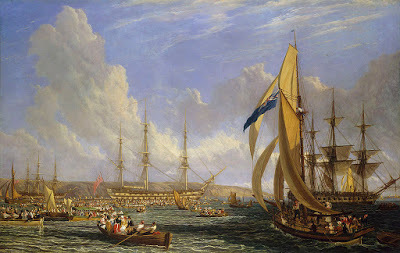 Tourists seeking Napoleon aboard the Bellerophonpainting by John James Chalon, 1817
Tourists seeking Napoleon aboard the Bellerophonpainting by John James Chalon, 1817
On August 7, he was transferred to the HMS Northumberland for the voyage to his imprisonment on the Island of St. Helena in the South Atlantic, arriving August 17.
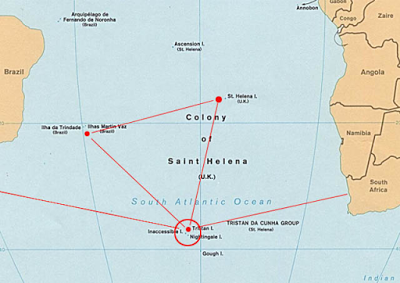 Remoteness of St. Helena in the South Atlantic
Remoteness of St. Helena in the South Atlantic
St. Helena is more than 1,200 miles from the nearest landmass. He lived there, until his death on May 5, 1821.
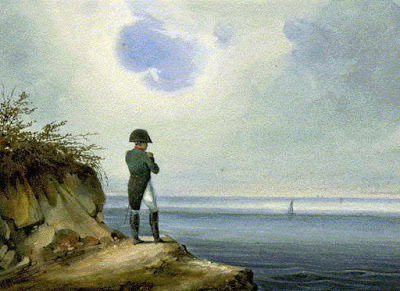 Napoleon on St Helena
Napoleon on St Helena
The island was small, wind-blown and not particularly pleasant. The ex-emperor was accompanied by a few companions. The British governor of the island, Sir Hudson Lowe, was determined there would be no second escape from captivity.
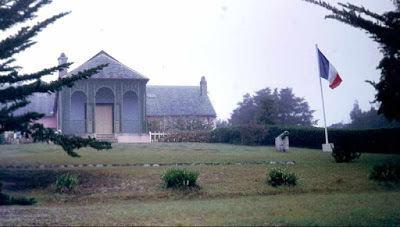 Longwood, Napoleon;s residence on St Helena
Longwood, Napoleon;s residence on St Helena
On St Helena, Napoleon composed his self-congratulatory memoirs. He found excuses in the mistakes of his generals and others for all his defeats and shortcomings. But however shallow these justifications, many of his observations are applauded by the devotees of the cult which has grown around his memory. He never stopped complaining about the conditions of his captivity, but none of the far-fetched schemes for his rescue ever materialized in the face of the British navy and the remote position of St. Helena.
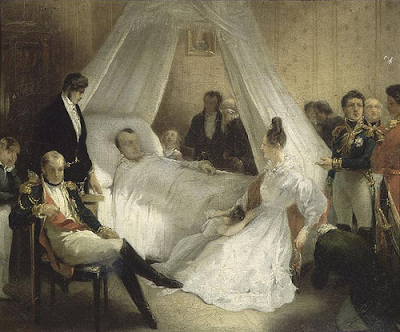 Death of Napoleon by Carl von Steuben
Death of Napoleon by Carl von Steuben
Napoleon died in 1821 of a stomach ailment, probably cancer. He was 51 years of age. A similar disease had caused his father’s death at the early age of 40. Napoleon in middle age often complained of stomach problems. Many believe he was poisoned, as large amounts of arsenic were found in his remains. Nothing can be disproven about the poison as arsenic was often found in various ointments and lotions of the day, as well as in the formula for the green inks and dyes in the wallpaper of his living quarters.
He was buried on St. Helena until his remains were returned to France in 1840.,
 Napoleon and the Garde
Napoleon and the GardeAfter the Battle on the 18th of June, Napoleon tried unsuccessfully to re-group. Unable to sort out the demoralized and scattered sildiers, he turned over command of his armies to General Soult and fled to Paris. The armies had about 150,000 troops stationed around France, including General Grouchy’s 60,000, who returned to Laon by June 26. Another 175,000 (?) conscripts were in training. There were also General Rapp’s Armee of the Rhine and General Lamarque’s Armee of La Vendee, still in place waiting for the Austrians and Russians. Napoleon wanted to continue the war, but he needed political and financial support.
 Rowlandson on Napoleon's Legacy
Rowlandson on Napoleon's LegacyNapoleon was unsuccessful in getting the Chamber of Deputies -- or anybody else except his closest confidantes -- to agree to renew the war.
 Marquis de Lafayette, 1790
Marquis de Lafayette, 1790 Lafayette, 1825
Lafayette, 1825The hero of the American Revolution, the Marquis de Lafayette (1757-1834) spoke against Napoleon in the Chamber, in answer to pleas of the disgraced emperor by his brother Lucien Bonaparte. Lafayette said:“By what right do you dare accuse the nation of…want of perseverance in the emperor’s interest? The nation has followed him on the fields of Italy, across the sands of Egypt and the plains of Germany, across the frozen deserts of Russia. … The nation has followed him in fifty battles, in his defeats and his victories, and in doing so we have to mourn the blood of three million Frenchmen.”
Lafayette’s views prevailed and Napoleon was rejected. His attempted abdication in favor of his four-year-old son on June 22 (and by some reports, a failed suicide) was ignored by the Allies.
 Marie Louise had fled to Austria with her son.
Marie Louise had fled to Austria with her son.Fouché, president of the new provisional government, sent word Napoleon should leave Paris. Napoleon stayed for a few days at his late first wife’s chateau, Malmaison, just west of Paris. Here he and Josephine(who died in 1814) had enjoyed happiness and success. How he must have yearned for those days to return.
 Malmaison, 2014
Malmaison, 2014The Prussians were approaching by June 29, and he did not want to be captured. When he got word from the provisional government that he was not be issued any safe conduct by Blücher or Wellington, Napoleon decided to travel to the Atlantic coast and find a ship to take him to the United States, where he hoped to find refuge; he arrived in Rochefort on July 3. However, the British blockade, in effect again since his escape from Elba, made that impossible. Instead, he negotiated his surrender to Captain Frederick Maitland aboard the HMS Bellerophon on July 15.
An amusing aside: Upon boarding the HMS Bellerophon, Napoleon took over the cabin of the Captain and invited him and others to breakfast with him. Captain Humphrey Senhouse, captain of another ship in the fleet, later wrote to his wife: “I have just returned from dining with Napoleon Bonaparte. Can it be possible?”
 Napoleon Aboard the Bellerophon, by Sir Charles Lock Eastlake
Napoleon Aboard the Bellerophon, by Sir Charles Lock EastlakeNapoleon appealed to the Prince Regent: “the most powerful, the most constant, and the most generous of my foes.” But the Government of Lord Liverpool was not inclined to make any allowances, and Prinny had enough troubles of his own.
 Napoleon Aboard the Bellerophon by Sir William Quiller Orchardson (1832-1910)
Napoleon Aboard the Bellerophon by Sir William Quiller Orchardson (1832-1910)In the meantime, the Allies had entered Paris on July 7, 1815, and successfully arranged for Louis XVIII to take the throne, which he did on July 8.
The Bellerophon sailed to Torbay arriving July 24 and on to Plymouth where Napoleon became a sort of tourist attraction as people hired boats to go out and see him aboard the Bellerophon where he was kept.
 Tourists seeking Napoleon aboard the Bellerophonpainting by John James Chalon, 1817
Tourists seeking Napoleon aboard the Bellerophonpainting by John James Chalon, 1817 On August 7, he was transferred to the HMS Northumberland for the voyage to his imprisonment on the Island of St. Helena in the South Atlantic, arriving August 17.
 Remoteness of St. Helena in the South Atlantic
Remoteness of St. Helena in the South AtlanticSt. Helena is more than 1,200 miles from the nearest landmass. He lived there, until his death on May 5, 1821.
 Napoleon on St Helena
Napoleon on St HelenaThe island was small, wind-blown and not particularly pleasant. The ex-emperor was accompanied by a few companions. The British governor of the island, Sir Hudson Lowe, was determined there would be no second escape from captivity.
 Longwood, Napoleon;s residence on St Helena
Longwood, Napoleon;s residence on St HelenaOn St Helena, Napoleon composed his self-congratulatory memoirs. He found excuses in the mistakes of his generals and others for all his defeats and shortcomings. But however shallow these justifications, many of his observations are applauded by the devotees of the cult which has grown around his memory. He never stopped complaining about the conditions of his captivity, but none of the far-fetched schemes for his rescue ever materialized in the face of the British navy and the remote position of St. Helena.
 Death of Napoleon by Carl von Steuben
Death of Napoleon by Carl von SteubenNapoleon died in 1821 of a stomach ailment, probably cancer. He was 51 years of age. A similar disease had caused his father’s death at the early age of 40. Napoleon in middle age often complained of stomach problems. Many believe he was poisoned, as large amounts of arsenic were found in his remains. Nothing can be disproven about the poison as arsenic was often found in various ointments and lotions of the day, as well as in the formula for the green inks and dyes in the wallpaper of his living quarters.
He was buried on St. Helena until his remains were returned to France in 1840.,
Published on July 08, 2015 00:30
July 5, 2015
THE AUDIENCE - A REVIEW
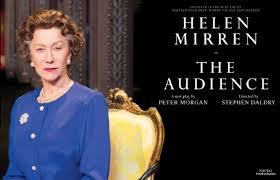
Recently, my daughter, Brooke, decided to surprise herself with tickets to see Billy Joel for her birthday. She bought two tickets to the concert and sent me a text message -
Brooke: Just got two tix to see Billy Joel for my birthday. No one I'd rather spend my birthday with than you so you're coming. Already bought. You can't say no.
Me: OK. Where?
Brooke: MSG
Me: Huh?
Brooke: Madison Square Garden.
Me: In NYC?!
And so we planned a long weekend in Manhattan. It occured to me to look online to see what was playing in the theatres during our stay. And look what I found -
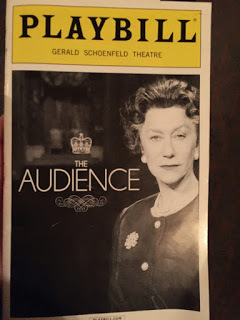
It took me a New York minute to click on the "buy" button. And then I sent Brooke a text -
Me: I just got us two tix to see Helen Mirren in The Audience.
Brooke: Who?
Me: Helen Mirren. British actress. You'll know her when we see her. She's playing the Queen.
Brooke: K
K? That's what you say to two tickets to see The Audience? K?
So, Thursday night we went to see Billy Joel at the Garden. He was fabulous. Here's a clip of Piano Man from the show we attended on May 28.
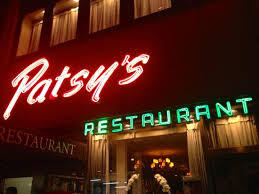
And on Friday night we had dinner at Patsy's iconic Italian restaurant and then headed to the theatre to see Dame Helen (Yay!)
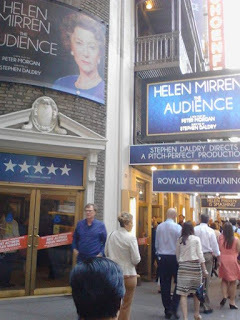
The Schoenfeld Theatre is intimate in size, so when we found our seats, I was delighted to find that we were just six rows back from the stage. I could write my own review of the play, which, unsurprisingly, was fabulous, but there are others who have written better and so I give you the excellent piece written for the Huffington Post:
Take a revered, honored and accomplished actress (Dame Helen Mirren) and put her in a new play which reprises a character that won her a Best Actress Oscar in 2006 (as Elizabeth in "The Queen"). And not a mere ripoff. Put it in the hands of Peter Morgan, who wrote "The Queen," and whose theatrical bonafides include the astonishingly good Frost/Nixon; and director Stephen Daldry, of the stunning 1992 revival of An Inspector Calls and the international musical hit Billy Elliott. There are enough fans of Mirren, and H.R.H., and Anglophile television, to attract S.R.O. audiences in the West End and on Broadway for as long as the star wishes to wear the crown.
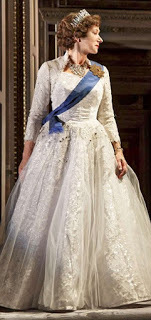
"Snapshots from The Queen," you might call it; in this case, it is more like a scrapbook. "The Queen" was set in one year of Elizabeth's reign, 1997, when she was dealing with the death of Princess Diana; Morgan's The Audience centers on sixty years-worth of Elizabeth's weekly audiences with her Prime Ministers (eight of whom are represented, starting with Winston Churchill and ending with the current David Cameron). And there's the rub. While most theatergoers are likely to be thrilled byThe Audience--or more precisely, by Mirren's performance in The Audience--the concept dictates that we will be seeing pages from a scrapbook, without the dramatic heft that would make it a fine and/or important play.
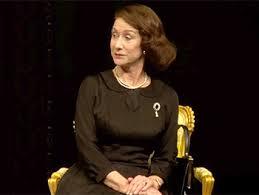
Yes, there is great life for The Audience with Helen Mirren; but the script itself seems to be merely an element of the evening devised to support the star performance, in the same manner as Bob Crowley's sets and costumes and Ivana Primorac's hair and make-up. Consider The Audience without the participation of Helen Mirren; while other stars are likely to try it--Kristin Scott Thomas is scheduled to do the play at London's Apollo next month--the appeal, here, is watching the star of "The Queen" playing The Queen live and in person. Compare this to Frost/Nixon; while original stars Sheen and Langella were unforgettable in the roles, the play is more than strong enough to work with any number of actors.
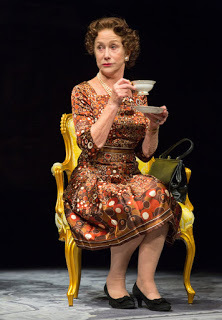
The format is simple enough. The Equerry--a combination butler/narrator--sets the scene; Geoffrey Beevers, one of the four actors imported with Mirren from London, has a droll and authoritative, raised-eyebrow manner which keeps the evening moving. One is slightly surprised that he doesn't start the affair with one of those "the action starts in 1936, before the age of cell phones, so please do toggle yours off" speeches. We then see Elizabeth with one of her more familiar prime ministers, John Major (a somewhat restrained and not-quite-comfortable Dylan Baker). Major exits; Equerry makes a little speech; a team of ladies-in-waiting help Mirren through an impressive, onstage costume change that trims forty-three years; and we see the silhouette of her first prime minister, Winston Churchill. Daldry gives Dakin Matthews a grand reveal, almost as if the silhouette of Alfred Hitchcock sprang to life. (This was presumably effective in not-so-merry olde England, but at the press preview attended it was clear that a major portion of the patrons had no idea who this Mr. Churchill was.)
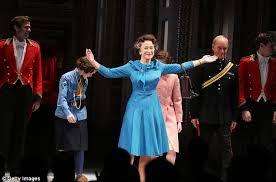
That's the framework. Between ministers, Mirren has costume and wig changes; some onstage, some off, and some rather remarkable--but there's something faulty when one of the major highlights of an entertainment are the costume changes. (The most memorable element of the recent musical Cinderella, alas, was a costume change--which kept people talking but was indicative of the lackluster show itself.) Morgan also gives us a running character he calls "Young Elizabeth"--played at the performance attended by Sadie Sink, who alternates in the role with Elizabeth Teeter--who talks to one servant or other (and eventually her elder self) about how she would rather be able to go outside and play like all the other girls and boys.
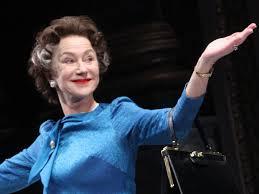
The "imaginary conversations from history" nature of things is interrupted by the appearance of Harold Wilson, the Labour minister who served from 1964-70 and 1974-76. Wilson has an awkward, bull-in-the-china-shop scene in the first act, and a highly amusing scene with the queen in Scotland, in which he describes the Queen's Balmoral Castle as a "Rheinland Schloss." (He continually kids the Regent about her family's Germanic heritage.) The play ends with a third Wilson encounter, this one moving and emotionally affecting.
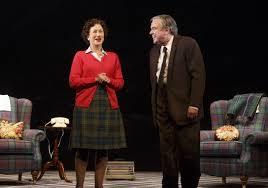
I can't say whether the Wilson scenes are better than the rest of the play because of the actor, Richard McCabe; or whether Mr. McCabe, who won the Olivier Award for this performance (as did Mirren), sparks the play alive because of the writing. In any event, Wilson is the only Minister up there created as more than a revue sketch. In fact, Elizabeth and Wilson--as drawn by Morgan--could populate their own play, and it might well be as compelling as Frost/Nixon.
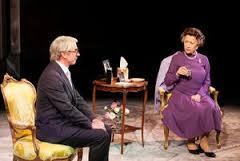
Mr. McCabe is a treat to watch. So, to a lesser extent, is Michael Elwyn as Anthony Eden. His participation is restricted to one, short scene; but it offers high stakes writing, centering on the Suez crisis of 1956, which tarnished the United Kingdom's place in the postwar world and caused Eden's resignation in disgrace. The Suez scene, following Balmoral and followed by the Margaret Thatcher sequence, makes the second act far more involving than the first. This despite the fact that Judith Ivey, who storms on like a Texan Thatcher, seems somewhat out of place (although this might be a question of the writing).
So look to The Audience for an audience with Helen Mirren, dressed and coiffed as Elizabeth II. An audience with Helen Mirren makes a fine night's entertainment, but not--in this case--a compelling dramatic event.
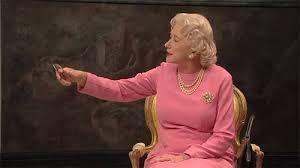

You can watch a clip of Dame Helen's acceptance speech from the 2015 Tony Awards when she was voted Best Leading Actress. She also won the Olivier Award for this role in 2013.
After the show, when Brooke and I were leaving the theater, we saw that barricades had already been erected either side of the stage door and a car was parked, ready and waiting, at the curb. Brooke offered to stand with me if I had my heart set on seeing Dame Helen, but I declined. I decided that it was best to recall her as she was on the stage, rather than when being hounded by autograph seekers.
So we turned away and began to walk down the block on our way to the Rum House for some much anticipated cocktails. Note: I had my very first Pimm's Cup. Yumm.
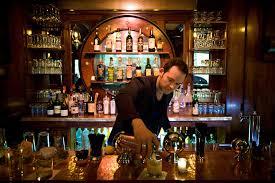
However, we'd only gone a few steps towards the next door theatre when we found that the actors who'd appeared in that play were already on their way out. I stood on tip toes and craned my neck in order see the actor who was causing such a stir.
Brooke: Can you see who it it?
Me: Yes.
Brooke: Well, who is it?
Me: Bill Nighy!
Brooke: Who?
Me: A British actor. He's been in Best Exotic Marigold Hotel, Pirates of the Caribean. You'd know him if you could see him, he looks exactly like himself! Too bad you're too short to see. We'll Google him when we get to the Rum House.

Bill Nighy is starring in Skylight with Carey Mulligan
New York was wonderful, as it turned out, and it was great to have four whole days alone with Brooke. Still, I didn't see myself returning any time soon - until I read that Colin Firth is set to play Henry Higgins in the Broadway revival of My Fair Lady.

Published on July 05, 2015 23:00
July 3, 2015
WATERLOO'S AFTERMATH, PART ONE
THE BATTLE OF WATERLOO'S AFTERMATH
As evening approached on June 18, 1815, the Allied forces were repelling the attack of the French Imperial Garde in the center and the Prussian forces had arrived from the east.
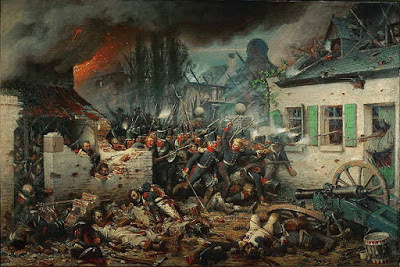
The Prussians attack Plancenoit by German painter Adolph Northen (1828-1876)
The arrival of the Prussians was timely indeed. The Prussians took the hamlet of Plancenoit and soon, the French forces were fleeing in disarray, leaving equipment and wounded behind in their haste.
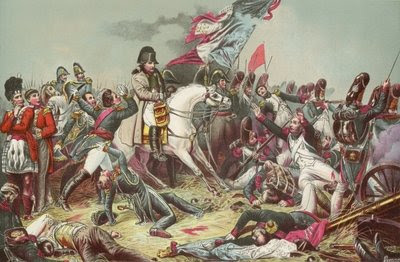 Napoleon at Waterlooby Charles de Steuben, (1788-1856)
Napoleon at Waterlooby Charles de Steuben, (1788-1856)
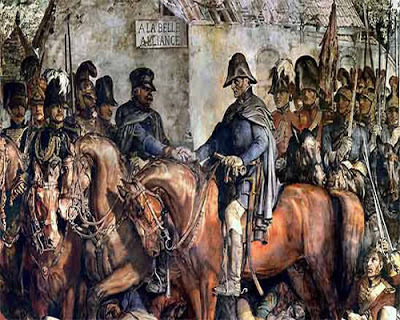 Meeting of Wellington and Blücherdetail of mural in Palace of Westminster (Houses of Parliament) by Irish Artist Daniel Maclise (1806-1870), completed 1858
Meeting of Wellington and Blücherdetail of mural in Palace of Westminster (Houses of Parliament) by Irish Artist Daniel Maclise (1806-1870), completed 1858
Late in the evening after the battle, Blücher and Wellington met at the inn La Belle Alliance and shook hands. In a great ironic twist, the two victorious generals spoke in the language of their enemy – the only language they both knew was French, though Blücher supposedly only knew a few words: “Mon Dieu, quelle affaire!”
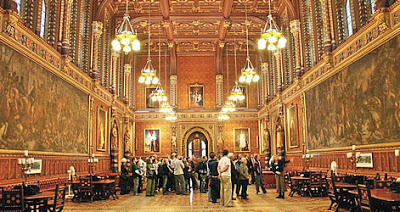
Royal Gallery, Palace of Westminster, London
They decided Wellington’s troops should rest up, bury the dead, and then come toward France. The Prussians, relatively fresh, would pursue the French army.The two victorious generals met and agreed the Prussians woould continue to pursue the French troops south toward France. The Allied troops would bury the dead, treat the wounded, rest up and catch up soon. Neither man probably realized that for the most part, Napoleon was finished and they would be taking over Paris in weeks.
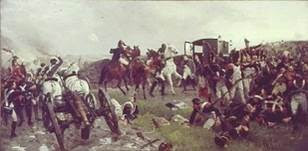 Prussians Capture Napoleon's Carriage
Prussians Capture Napoleon's Carriage
In the evening of the 18th, Prussian troops captured Napoleon’s carriage which he had to abandon and flee on horseback. Later the carriage was displayed in London where it was a famous attraction; it later was part of Madame Tussaud’s wax museum, but was destroyed in a fire there in 1925.
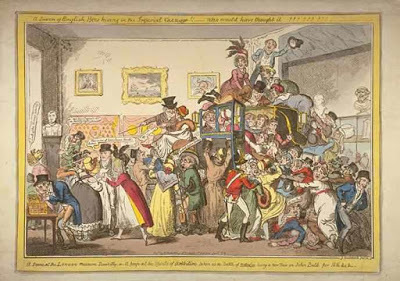 Thomas Rowlandson's 1816 version of the display at Bullock's Museum
Thomas Rowlandson's 1816 version of the display at Bullock's Museum
Though the battle had been won and the Prussian troops were chasing the remnants of Napoleon’s armies south toward France, more battles were expected in the coming days. Perhaps no one would have predicted it was, for all practical purposes, over – or would be in a couple of weeks. There was resistance and further fighting, but it was minimal, on a Napoleonic scale, that is.
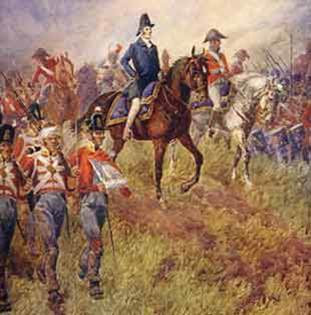 Wellington crosses the battlefield
Wellington crosses the battlefield
The Duke of Wellington rode through the carnage back to his headquarters in the village of Waterloo where he would write his despatch to Lord Bathurst in London declaring victory. Later the Duke of Wellington said, “I hope to God I have fought my last battle…I am wretched even at the moment of victory, and I always say that next to a battle lost, the greatest misery is a battle gained.”
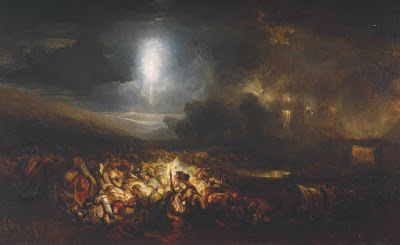 Waterloo by Joseph Mallord William Turner (1775 - 1851)
Waterloo by Joseph Mallord William Turner (1775 - 1851)
This painting by Turner was created after he toured the battlefield and sketched the scene. It emphasizes the tragedy of so many deaths, so many lost forever. It was the first battle in which Napoleon faced Wellington, and for both men, indeed their last military battle. The Battle of Waterloo left 9,500 dead; 32,000 wounded.
 Battle of Waterloo by Irish painter William Sadler II (1782-1839)
Battle of Waterloo by Irish painter William Sadler II (1782-1839)
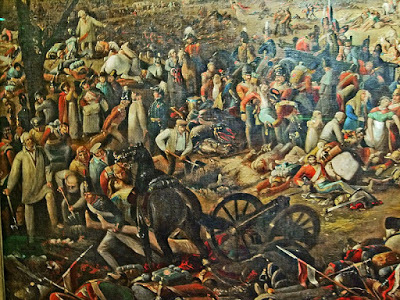 The Morning After the Battle by John Heaviside Clark
The Morning After the Battle by John Heaviside Clark
On the battlefield, there were tens of thousands of dead and dying men and horses. Thieves crept among the bodies, robbing them of anything valuable. Parties of soldiers collected the wounded and took them to field hospitals. The dead were buried, sometimes in mass graves. The army surgeons were exhausted having spent the battle and the night tending the injured.
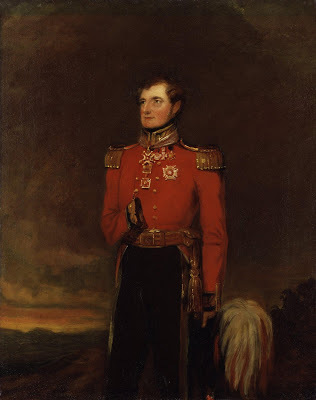 Fitzroy Somerset, later 1st Baron Raglan, by William Salter
Fitzroy Somerset, later 1st Baron Raglan, by William Salter
One of Wellington’s ADCs, Fitzroy Somerset (1788-1855), had his right arm amputated. Before they carried off the arm, he demanded to have the ring his wife (one of the Duke’s nieces) had given him removed from the lost hand. He learned to write with his left hand and was a secretary to Wellington for many years. He was named 1st Baron Raglan in 1852 and led the British Army in the Crimean War. He died before the Allied victory at Sevastopol was complete, partly of depression over criticism of his conduct of the war.
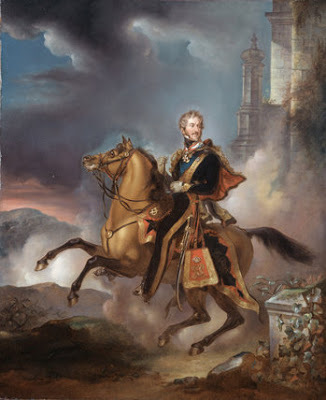 General Henry Paget, 1st Marquess of Anglesey, 1815by artist Peter Edward Stroehling (1768-1826)
General Henry Paget, 1st Marquess of Anglesey, 1815by artist Peter Edward Stroehling (1768-1826)
Another famous Waterloo amputation was Paget’s leg. Henry Paget, Earl of Uxbridge (soon to be Marquess of Anglesey), commanded the cavalry at Waterloo. He was seated on his horse talking to Wellington near the conclusion of the battle when his leg was shattered by a cannon shot. He said, "By God, sir, I've lost my leg. The Duke said, "By God, sir, so you have!"
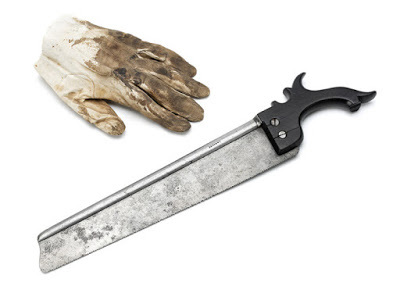
Surgical Saw and bloodied glove from Waterloo
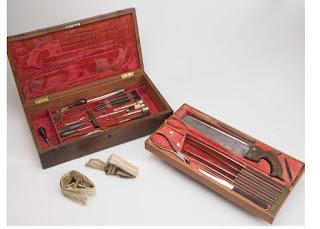 Surgical Instruments
Surgical Instruments
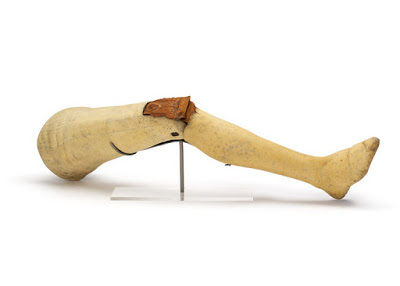 Artificial leg of Marquess of Anglesey
Artificial leg of Marquess of Anglesey
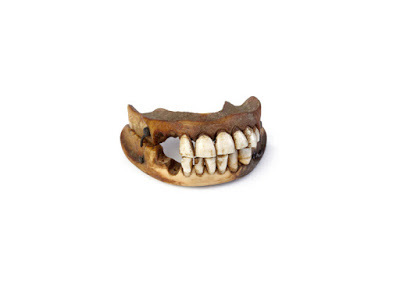 Waterloo Teeth for more relics from Waterloo 200, click hereOne of the gruesome aspects was the collection of the teeth. It was done after every battle in those days, as the teeth were valuable and much better than most false teeth – for many years, dentists advertised Waterloo Teeth.
Waterloo Teeth for more relics from Waterloo 200, click hereOne of the gruesome aspects was the collection of the teeth. It was done after every battle in those days, as the teeth were valuable and much better than most false teeth – for many years, dentists advertised Waterloo Teeth.
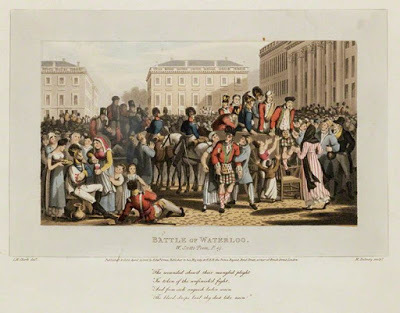 Wounded arriving in Brussels; Excerpt from Sir Walter Scott's Poem The Field of WaterlooThe wounded shew'd their mangled plightIn token of the unfinish'd fight,And from each anguish-laden wainThe blood-drops laid the dust like rain!
Wounded arriving in Brussels; Excerpt from Sir Walter Scott's Poem The Field of WaterlooThe wounded shew'd their mangled plightIn token of the unfinish'd fight,And from each anguish-laden wainThe blood-drops laid the dust like rain!
Many of the wounded were carried in carts (aka wains) into Brussels where thousands were nursed in makeshift hospitals and homes. Some of these men were luckier than those carried directly into field hospitals, as in the open air they were much less exposed to infection than in the crowded piles of dying in the hospitals.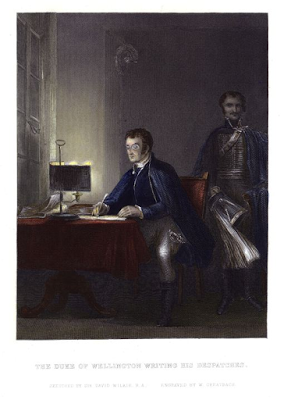
After meeting with Blücher, the Duke returned to the village of Waterloo and wrote his despatches to Lord Bathurst and the Prince Regent. When the despatches were ready, on June 19, Wellington asked Major Henry Percy, either (according to which account you believe) the only unwounded ADC or the least-wounded of the eight ADCs Wellington had on June 18, to take the despatches and the captured Eagle standards and flags to London.
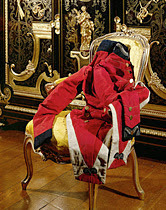 Jacket worm by Henry Percy when on the battlefield and delivering the despatch to London
Jacket worm by Henry Percy when on the battlefield and delivering the despatch to London
Percy got a chaise to the port of Ostend and embarked on the brig HMS Peruvian. Some accounts tell of the becalmed ship and the completion of the voyage by rowing – the Captain James White RN and Percy, with several other sailors, taking the oars themselves. From their landing at Broadstairs, Kent, about 3 pm on June 21, Percy hurried to London, changing horses at Canterbury, Sittingbourne, and Rochester. At first he could not find Lord Bathurst or Prime Minister Lord Liverpool. But with the French Eagles of the 45th and 105th sticking out of the windows of the carriage, they soon attracted a crowd, following them and cheering.
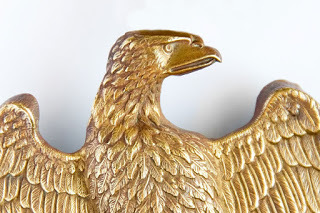 A French Eagle as on the top of the battle flags
A French Eagle as on the top of the battle flags
Eventually he found the officials and together they carried the news and the Eagles to #14 (or #16 in some accounts) St. James’s Square, the home of Mr. and Mrs. Boehm who were hosting a grand party for the Prince Regent and his brother the Duke of York, C-in-C of the Army.
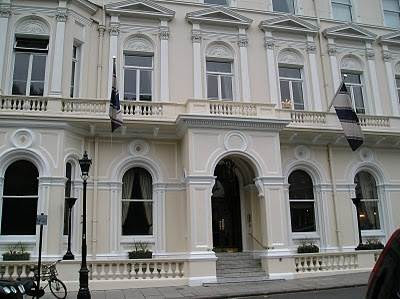 The Boehm residence, St. James Square, today the East India United Service Club
The Boehm residence, St. James Square, today the East India United Service Club
According to most accounts, the excited crowds following Percy’s mad dash around London were heard by those at the party. When the disheveled Percy, still in blood-stained uniform, came inside and laid the Eagles at the Regent’s feet, the Prince immediately promoted him to Colonel Percy. The Prince Regent withdrew to read the despatches and returned in tears at the carnage, but elated at the victory.
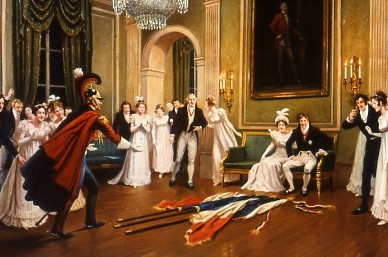 An artist's version of Presenting the Eagles; actually there were only two
An artist's version of Presenting the Eagles; actually there were only two
As the party dispersed without the planned dancing or supper, Mrs. Boehm was said to have observed that it would have been much better to have waited until after the party to present the despatches. No one else agreed of course. Mr. Boehm later died bankrupt. Mrs. Boehm lived out her life in a Grace and Favor apartment at Hampton Court.
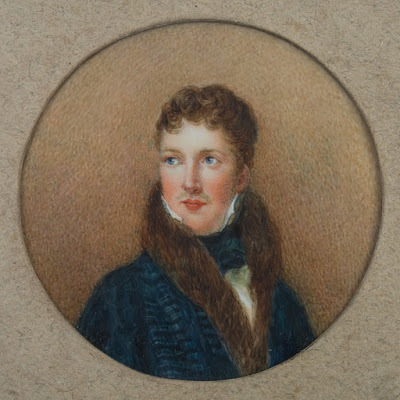 Major Henry Percy (1785-1825)
Major Henry Percy (1785-1825)
Major, now Colonel Percy, retired in 1821, and became a member of the House of Commons in 1823; however, he died only a year later, age 40.
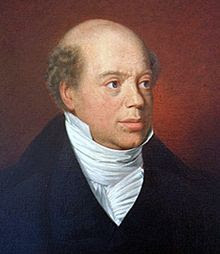 Nathan Rothschild (1777-1836)
Nathan Rothschild (1777-1836)
Among the many legends that have grown around the Battle of Waterloo, perhaps none is more controversial and even inflammatory than the story of the Rothschild fortune – or lack of it. Some versions say that banker Nathan Rothschild, who had been providing gold to the British government through his network of relatives in banking houses on the continent, learned about the Waterloo victory before anyone else in London and made a killing in stocks and/or bonds by buying low when hopes were dim and selling high when victory had been secured. Various versions of the story have him gaining the knowledge from his company spies at the exiled entourage of Louis XVIII, another that he communicated with the continent by carrier pigeon. Many other researchers claim all such stories are bunk, inspired by jealousy and anti-Semitism, even fueled by Nazi propaganda during WWII. A careful study of the variable rates in British markets of the immediate period around Waterloo would prove no one made a killing in stocks, consols, or bonds of any kind, many conclude.Whatever the arguments, the Rothschild brothers had long proved their ability to handle financial matters on behalf of business, government and their own interests. Perhaps no special circumstances are needed to account for their wealth.
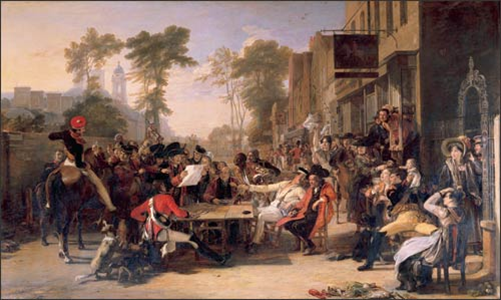 Chelsea Pensioners by Sir David Wilkie
Chelsea Pensioners by Sir David Wilkie
A happier story is the arrival of the Waterloo despatch at Chelsea Hospital where copies were read by retired soldiers. This famous painting, commissioned from artist David Wilkie by the Duke of Wellington, completed in 1822, hangs in Apsley House.
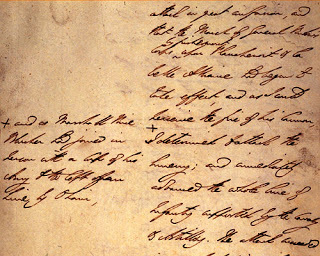 An excerpt from the Waterloo Despatch in Wellington's hand
An excerpt from the Waterloo Despatch in Wellington's hand
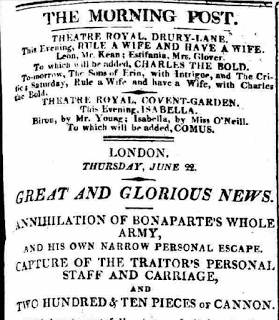 From The Morning Post, 22 June, 1915
From The Morning Post, 22 June, 1915
To read the official publication of the Despatch in the London Gazette, click here.
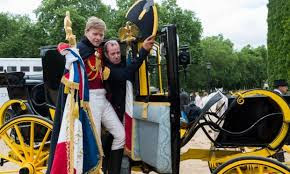 Re-enactment of despatch delivery. 2015
Re-enactment of despatch delivery. 2015
For an account of the reenactment of the delivery of the Wellington despatch, click here.
IN WATERLOO'S AFTERMATH, PART TWO, WE WILL DEAL WITH THE DISPOSAL OF NAPOLEON, NEXT WEEK.
As evening approached on June 18, 1815, the Allied forces were repelling the attack of the French Imperial Garde in the center and the Prussian forces had arrived from the east.

The Prussians attack Plancenoit by German painter Adolph Northen (1828-1876)
The arrival of the Prussians was timely indeed. The Prussians took the hamlet of Plancenoit and soon, the French forces were fleeing in disarray, leaving equipment and wounded behind in their haste.
 Napoleon at Waterlooby Charles de Steuben, (1788-1856)
Napoleon at Waterlooby Charles de Steuben, (1788-1856) Meeting of Wellington and Blücherdetail of mural in Palace of Westminster (Houses of Parliament) by Irish Artist Daniel Maclise (1806-1870), completed 1858
Meeting of Wellington and Blücherdetail of mural in Palace of Westminster (Houses of Parliament) by Irish Artist Daniel Maclise (1806-1870), completed 1858Late in the evening after the battle, Blücher and Wellington met at the inn La Belle Alliance and shook hands. In a great ironic twist, the two victorious generals spoke in the language of their enemy – the only language they both knew was French, though Blücher supposedly only knew a few words: “Mon Dieu, quelle affaire!”

Royal Gallery, Palace of Westminster, London
They decided Wellington’s troops should rest up, bury the dead, and then come toward France. The Prussians, relatively fresh, would pursue the French army.The two victorious generals met and agreed the Prussians woould continue to pursue the French troops south toward France. The Allied troops would bury the dead, treat the wounded, rest up and catch up soon. Neither man probably realized that for the most part, Napoleon was finished and they would be taking over Paris in weeks.
 Prussians Capture Napoleon's Carriage
Prussians Capture Napoleon's CarriageIn the evening of the 18th, Prussian troops captured Napoleon’s carriage which he had to abandon and flee on horseback. Later the carriage was displayed in London where it was a famous attraction; it later was part of Madame Tussaud’s wax museum, but was destroyed in a fire there in 1925.
 Thomas Rowlandson's 1816 version of the display at Bullock's Museum
Thomas Rowlandson's 1816 version of the display at Bullock's MuseumThough the battle had been won and the Prussian troops were chasing the remnants of Napoleon’s armies south toward France, more battles were expected in the coming days. Perhaps no one would have predicted it was, for all practical purposes, over – or would be in a couple of weeks. There was resistance and further fighting, but it was minimal, on a Napoleonic scale, that is.
 Wellington crosses the battlefield
Wellington crosses the battlefieldThe Duke of Wellington rode through the carnage back to his headquarters in the village of Waterloo where he would write his despatch to Lord Bathurst in London declaring victory. Later the Duke of Wellington said, “I hope to God I have fought my last battle…I am wretched even at the moment of victory, and I always say that next to a battle lost, the greatest misery is a battle gained.”
 Waterloo by Joseph Mallord William Turner (1775 - 1851)
Waterloo by Joseph Mallord William Turner (1775 - 1851)This painting by Turner was created after he toured the battlefield and sketched the scene. It emphasizes the tragedy of so many deaths, so many lost forever. It was the first battle in which Napoleon faced Wellington, and for both men, indeed their last military battle. The Battle of Waterloo left 9,500 dead; 32,000 wounded.
 Battle of Waterloo by Irish painter William Sadler II (1782-1839)
Battle of Waterloo by Irish painter William Sadler II (1782-1839) The Morning After the Battle by John Heaviside Clark
The Morning After the Battle by John Heaviside ClarkOn the battlefield, there were tens of thousands of dead and dying men and horses. Thieves crept among the bodies, robbing them of anything valuable. Parties of soldiers collected the wounded and took them to field hospitals. The dead were buried, sometimes in mass graves. The army surgeons were exhausted having spent the battle and the night tending the injured.
 Fitzroy Somerset, later 1st Baron Raglan, by William Salter
Fitzroy Somerset, later 1st Baron Raglan, by William SalterOne of Wellington’s ADCs, Fitzroy Somerset (1788-1855), had his right arm amputated. Before they carried off the arm, he demanded to have the ring his wife (one of the Duke’s nieces) had given him removed from the lost hand. He learned to write with his left hand and was a secretary to Wellington for many years. He was named 1st Baron Raglan in 1852 and led the British Army in the Crimean War. He died before the Allied victory at Sevastopol was complete, partly of depression over criticism of his conduct of the war.
 General Henry Paget, 1st Marquess of Anglesey, 1815by artist Peter Edward Stroehling (1768-1826)
General Henry Paget, 1st Marquess of Anglesey, 1815by artist Peter Edward Stroehling (1768-1826)Another famous Waterloo amputation was Paget’s leg. Henry Paget, Earl of Uxbridge (soon to be Marquess of Anglesey), commanded the cavalry at Waterloo. He was seated on his horse talking to Wellington near the conclusion of the battle when his leg was shattered by a cannon shot. He said, "By God, sir, I've lost my leg. The Duke said, "By God, sir, so you have!"

Surgical Saw and bloodied glove from Waterloo
 Surgical Instruments
Surgical Instruments Artificial leg of Marquess of Anglesey
Artificial leg of Marquess of Anglesey Waterloo Teeth for more relics from Waterloo 200, click hereOne of the gruesome aspects was the collection of the teeth. It was done after every battle in those days, as the teeth were valuable and much better than most false teeth – for many years, dentists advertised Waterloo Teeth.
Waterloo Teeth for more relics from Waterloo 200, click hereOne of the gruesome aspects was the collection of the teeth. It was done after every battle in those days, as the teeth were valuable and much better than most false teeth – for many years, dentists advertised Waterloo Teeth. Wounded arriving in Brussels; Excerpt from Sir Walter Scott's Poem The Field of WaterlooThe wounded shew'd their mangled plightIn token of the unfinish'd fight,And from each anguish-laden wainThe blood-drops laid the dust like rain!
Wounded arriving in Brussels; Excerpt from Sir Walter Scott's Poem The Field of WaterlooThe wounded shew'd their mangled plightIn token of the unfinish'd fight,And from each anguish-laden wainThe blood-drops laid the dust like rain!Many of the wounded were carried in carts (aka wains) into Brussels where thousands were nursed in makeshift hospitals and homes. Some of these men were luckier than those carried directly into field hospitals, as in the open air they were much less exposed to infection than in the crowded piles of dying in the hospitals.

After meeting with Blücher, the Duke returned to the village of Waterloo and wrote his despatches to Lord Bathurst and the Prince Regent. When the despatches were ready, on June 19, Wellington asked Major Henry Percy, either (according to which account you believe) the only unwounded ADC or the least-wounded of the eight ADCs Wellington had on June 18, to take the despatches and the captured Eagle standards and flags to London.
 Jacket worm by Henry Percy when on the battlefield and delivering the despatch to London
Jacket worm by Henry Percy when on the battlefield and delivering the despatch to LondonPercy got a chaise to the port of Ostend and embarked on the brig HMS Peruvian. Some accounts tell of the becalmed ship and the completion of the voyage by rowing – the Captain James White RN and Percy, with several other sailors, taking the oars themselves. From their landing at Broadstairs, Kent, about 3 pm on June 21, Percy hurried to London, changing horses at Canterbury, Sittingbourne, and Rochester. At first he could not find Lord Bathurst or Prime Minister Lord Liverpool. But with the French Eagles of the 45th and 105th sticking out of the windows of the carriage, they soon attracted a crowd, following them and cheering.
 A French Eagle as on the top of the battle flags
A French Eagle as on the top of the battle flagsEventually he found the officials and together they carried the news and the Eagles to #14 (or #16 in some accounts) St. James’s Square, the home of Mr. and Mrs. Boehm who were hosting a grand party for the Prince Regent and his brother the Duke of York, C-in-C of the Army.
 The Boehm residence, St. James Square, today the East India United Service Club
The Boehm residence, St. James Square, today the East India United Service Club According to most accounts, the excited crowds following Percy’s mad dash around London were heard by those at the party. When the disheveled Percy, still in blood-stained uniform, came inside and laid the Eagles at the Regent’s feet, the Prince immediately promoted him to Colonel Percy. The Prince Regent withdrew to read the despatches and returned in tears at the carnage, but elated at the victory.
 An artist's version of Presenting the Eagles; actually there were only two
An artist's version of Presenting the Eagles; actually there were only twoAs the party dispersed without the planned dancing or supper, Mrs. Boehm was said to have observed that it would have been much better to have waited until after the party to present the despatches. No one else agreed of course. Mr. Boehm later died bankrupt. Mrs. Boehm lived out her life in a Grace and Favor apartment at Hampton Court.
 Major Henry Percy (1785-1825)
Major Henry Percy (1785-1825)Major, now Colonel Percy, retired in 1821, and became a member of the House of Commons in 1823; however, he died only a year later, age 40.
 Nathan Rothschild (1777-1836)
Nathan Rothschild (1777-1836)Among the many legends that have grown around the Battle of Waterloo, perhaps none is more controversial and even inflammatory than the story of the Rothschild fortune – or lack of it. Some versions say that banker Nathan Rothschild, who had been providing gold to the British government through his network of relatives in banking houses on the continent, learned about the Waterloo victory before anyone else in London and made a killing in stocks and/or bonds by buying low when hopes were dim and selling high when victory had been secured. Various versions of the story have him gaining the knowledge from his company spies at the exiled entourage of Louis XVIII, another that he communicated with the continent by carrier pigeon. Many other researchers claim all such stories are bunk, inspired by jealousy and anti-Semitism, even fueled by Nazi propaganda during WWII. A careful study of the variable rates in British markets of the immediate period around Waterloo would prove no one made a killing in stocks, consols, or bonds of any kind, many conclude.Whatever the arguments, the Rothschild brothers had long proved their ability to handle financial matters on behalf of business, government and their own interests. Perhaps no special circumstances are needed to account for their wealth.
 Chelsea Pensioners by Sir David Wilkie
Chelsea Pensioners by Sir David WilkieA happier story is the arrival of the Waterloo despatch at Chelsea Hospital where copies were read by retired soldiers. This famous painting, commissioned from artist David Wilkie by the Duke of Wellington, completed in 1822, hangs in Apsley House.
 An excerpt from the Waterloo Despatch in Wellington's hand
An excerpt from the Waterloo Despatch in Wellington's hand From The Morning Post, 22 June, 1915
From The Morning Post, 22 June, 1915To read the official publication of the Despatch in the London Gazette, click here.
 Re-enactment of despatch delivery. 2015
Re-enactment of despatch delivery. 2015For an account of the reenactment of the delivery of the Wellington despatch, click here.
IN WATERLOO'S AFTERMATH, PART TWO, WE WILL DEAL WITH THE DISPOSAL OF NAPOLEON, NEXT WEEK.
Published on July 03, 2015 00:30
June 30, 2015
GUEST BLOGGER JO MANNING VISITS POLESDEN LACEY IN SURREY
AND HERE IS POLESDEN LACEY, A STATELY HOME IN SURREY WITH A BEAUTIFUL VIEW AND A CONNECTION TO REGENCY PLAYWRIGHT AND POLITICIAN RICHARD BRINSLEY SHERIDAN…
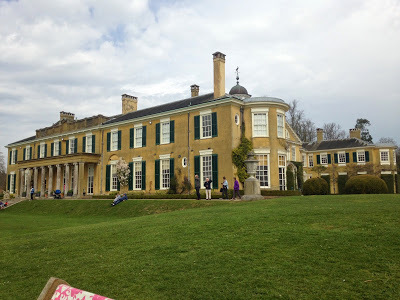
Polesden Lacey, the Edwardian country estate on a spectacular natural site overlooking a deep valley in Great Bookham, near Dorking, in Surrey, is best known for its influential hostess-with-the-mostest, Mrs Ronald Greville (aka “Mrs Ronnie”), who was an intimate of the royal family and anyone else who could claim to be anyone at the turn of the 20thcentury.
But it actually has a very long history dating back to Roman times – and, indeed, would it not have been a perfect site for a Roman temple? – though documentation of buildings on that site date back only to the 14thcentury or thereabouts.
One of Oliver Cromwell’s roundhead officers – the Parliamentarians who fought against the Cavalier forces of King Charles I in the English Civil War – bought this divine property in 1630, keeping the existing farm and constructing a new residence in situ.
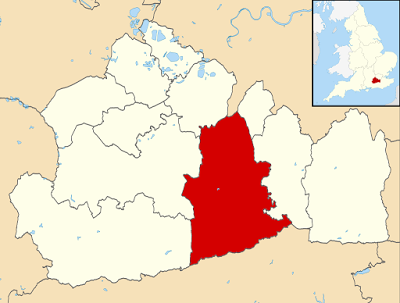
The Regency-era playwright Richard Brinsley Sheridan – after a long line of other owners and leaseholders – came into the picture in 1797, when his trustees, one Lord Grey and a Mr Whitbread, bought the Polesden Lacey lease for 12,384 pounds, using the 8,000 pound dowry of Sheridan’s second wife, Hester Jane Ogle, and money raised from the sale of shares in the Drury Lane Theatre, which he owned. (another source stated a higher price of 20,000 pounds was paid.)
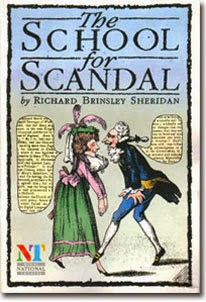
The Rivals and The School for Scandal are Sheridan’s best-known plays, still widely performed today. In my opinion, the world lost a literate and witty wordsmith when Sheridan decided to enter the world of Whig politics, but there was perhaps another motive to his service in parliament. As an MP he was safe against arrest for debt, and the playwright was chronically in debt. When he lost his seat in 1812 his creditors showed up in droves to claim what was owed them. Hence the loss of Polesden Lacey after a leasehold that spanned almost twenty years.
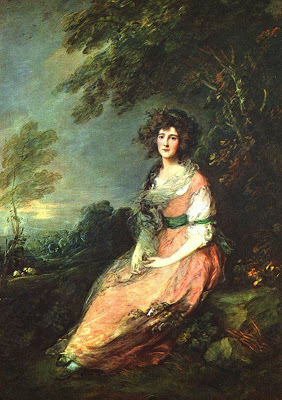 The breathtakingly beautiful Elizabeth Lynley, from the painting by Thomas Gainsborough. Elizabeth was from a very well-known family of musicians in Bath with whom the painter was extremely friendly; he painted many family members.
The breathtakingly beautiful Elizabeth Lynley, from the painting by Thomas Gainsborough. Elizabeth was from a very well-known family of musicians in Bath with whom the painter was extremely friendly; he painted many family members.
This sympathetic piece in the theatrehistory.com website sums him up:
“The real sheridan was not a pattern of decorous respectabilty, but we may fairly believe that he was very far from being the Sheridan of vulgar legend. Against stories about his reckless management of his affairs we must set the broad facts that he had no source of income but the Drury Lane Theatre, that he bore from it for thirty years all the expenses of a fashionable life, and the theatre was twice rebuilt during his proprietorship, the first time (1791) on account of its having been pronounced unsafe, and the second (1809) after a disastrous fire. Enough was lost in this way to account ten times over for all his debts. The records of his wild bets in the betting book of Brooks’ Club date from the years after the loss, in1792, of his first wife [the incomparable beauty Elizabeth Lynley] … the reminiscences of his son’s tutor, Mr Smyth, show anxious and fidgetty [sic] family habits curiously at variance with the accepted tradition of his imperturbable recklessness. He died on the 7thof July 1816, and was buried with great pomp in Westminster Abbey.”
If you are so inclined, you can pay Sheridan a visit in the Poets’ Corner at Westminster Abbey the next time you are in London:
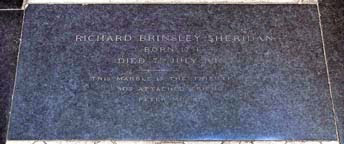
Although Sheridan began to demolish parts of the house around 1814, he did not get very far owing to burgeoning ill health and those always-problematic finances. He is credited, however, with extending the charming Long Walk to 1,300 feet from 900 feet. This walk was first laid out along the valley in 1761 on the 1,400 acre estate and it remains a very popular hiking trail with national trust visitors from far and wide as well as with local families and walking groups. Parallel to the Long Walk is another, called the Nun’s Walk, which is lined with beech, yew, and holly trees. (And, yes, for those of you who like to know these things, there is even a ha-ha, below a yew hedge that marks the garden’s boundary.)

Sheridan also made some attempts at landscaping the Polesden Lacey garden. In respect to that garden – and to his legendary reputation as a ladies’ man – the National Trust booklet attributes this quote to him: “Won’t you come into the garden? I would like my roses to see you.” Sheridan to a beautiful female guest at Polesden Lacey
The text in that booklet emphasizes how much Sheridan loved his country home, which he called “the nicest place, within a prudent distance of town, in England.” Notwithstanding his creditors, and the dual responsibilities of managing the Drury Lane Theatre and his parliamentary duties, he surely relished his role of country landlord and entertained, as they say, lavishly.
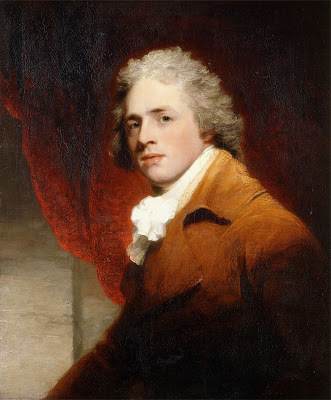 This “portrait of a gentleman”, by John Hoppner, has been traditionally identified as that of Richard Brinsley Sheridan
This “portrait of a gentleman”, by John Hoppner, has been traditionally identified as that of Richard Brinsley Sheridan
But, alas, the property was sold again, to a Joseph Bonsor (1768-1835), who commissioned the period’s master builder, Thomas Cubitt, to design and erect a new house, and this redesign formed the nexus of the current stately home. According to Bonsor’s obituary in The Gentleman’s Magazine , he was a self-made man, “the founder of his own fortune.” His success in the wholesale stationery trade enabled him to secure the sale of Polesden Lacey from Sheridan’s son in 1818.
Thomas Cubitt rebuilt the house in the neo-classical style. On the south front of the house, part of Cubitt’s villa is still visible: six bay windows with an Ionic-columned portico.
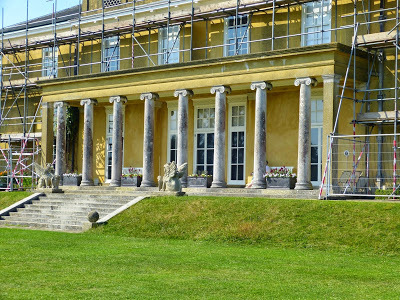 Some repairs taking place recently on the neo-classical south front of Polesden Lacey (what you don’t see is the graffiti chalked by schoolchildren on the steps leading to the great lawn)
Some repairs taking place recently on the neo-classical south front of Polesden Lacey (what you don’t see is the graffiti chalked by schoolchildren on the steps leading to the great lawn)
The next owner in line was a prominent Scottish physician (and, yes, a Scots theme runs through this history) named Sir Walter Farquahar. It was this good doctor who extended the walled garden and put more order into the various plantings. But more was to come for this splendid parcel of land.
In 1902 the estate became the property of Sir Clinton Dawkins, who commissioned the architect Sir Ambrose Macdonald Poynter, a major London architect whose grandfather was also an architect (a co-founder of the Institute of British Architects whose father was a distinguished painter) to make extensive renovations to Polesden Lacey. He went on to build the Royal Over-Seas League, Park Place, St James’s, a few years later.
And then, in 1906, along came the redoubtable Mrs Greville… who employed the architectural firm of Mewes and Davis (the designers of the Ritz Hotel in London) and the interior decorating firm of white, Allom & Co., to further gild the lily this house was becoming. (See below for the changes and expansions from the 1903 house to the present-day.)
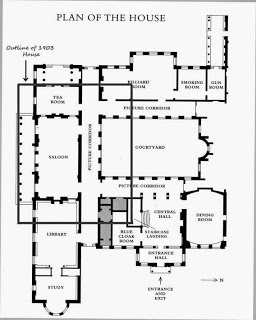
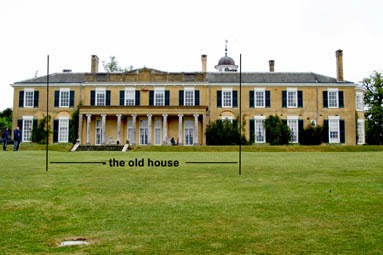 This gives an even better idea of the expansion!
This gives an even better idea of the expansion!
Some family background… Margaret Helen Anderson was born out of wedlock in 1863 to a Scottish brewery multimillionaire named William Mc Ewan and a woman named Helen Anderson. Mrs Anderson was said to be married to – or lived with – a man named William Anderson, who was a porter employed in Mc Ewan’s brewery. Mrs Anderson and Mr Mc Ewan wed after the death of Mr Anderson in1885. On Mc Ewan’s death in 1913, Margaret inherited his entire estate, becoming one of the wealthiest women in Britain.
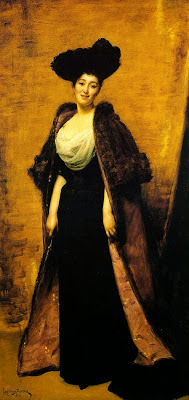 This gorgeous portrait (above) painted in 1891 by Carolus-Duran (who was John Singer Sargent’s teacher) sits on the landing of the central hall, on the way to the dining room… exactly where MrsGgreville loved to make a dramatic entrance and meet her guests as they went in to dinner…
This gorgeous portrait (above) painted in 1891 by Carolus-Duran (who was John Singer Sargent’s teacher) sits on the landing of the central hall, on the way to the dining room… exactly where MrsGgreville loved to make a dramatic entrance and meet her guests as they went in to dinner…
Margaret had been married in 1891 to the Honorable Ronald Henry Fulke Greville, a handsome gentleman identified as “a member of the racy Marlborough House set” who was said to have been “witty and good-natured.” Photos show him with a rakish moustache and piercing light blue eyes. He was the eldest son of the 2nd Lord Greville and a conservative MP for Bradford as well as a Captain in the 1st Life Guards. Greville and Margaret were, by all accounts, happily wed for seventeen years, until he died suddenly from complications of an emergency operation. She never remarried, though, as an immensely wealthy widow she probably had a number of men desirous of being in her company.
Why is this National Trust property, Polesden Lacey, important?
Well, for one, it is so closely associated with events in British history and with prominent historic personages – like Sheridan, like the assorted royals and foreign visitors with whom the Grevilles interacted – and Mrs Greville herself was an amazing character whose talent lay in bringing people together in an intimate salon setting and who was said to have had a remarkably sharp and witty tongue.
We would, I think, like to know much more about what she thought about what and whom, living through those two horrific world wars that upended British society as she had known it, but, as all of her personal letters, diaries and other papers were destroyed after her death, at her request...
One can be sure. then that the many things that swirled about her, all the racy and intriguing political/private/scandalous goings-on/et al., of the Edwardian era and the reign of King George VI (father to the present Queen, Elizabeth II) will never see her viewpoint’s light of day. It was too bad, because as an intimate of so many well-connected and powerful people, she was in a position to hear and see a great many things that could be illuminating, even obliquely.
She was, for one, very close to Elizabeth, the Queen Mother – Elizabeth and George VII (before he became king) spent part of their honeymoon at Polesden Lacey -- and Mrs Greville left the Queen Mother and her daughters the Princesses Elizabeth and Margaret, her most precious jewels…one a diamond necklace purported to have been owned by the French Queen Marie Antoinette.
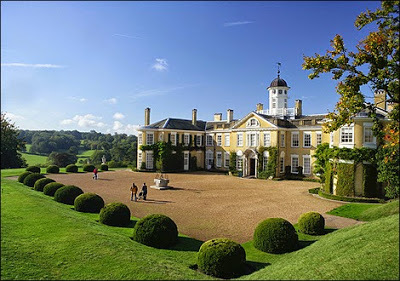
The widely-held expectation, in fact, was that she was going to leave Polesden Lacey to the House of Windsor in her will. (She and Ronald had no children.) However, she did not do that, gifting it to the National Trust instead.
(For those who want to know and see a little more than can be covered in this piece, there is an extensively-illustrated biography, published by the National Trust in 2013, written by Sian Evans: Mrs Ronnie: The Society Hostess Who Collected Kings. )
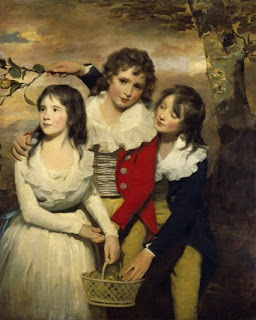 The Paterson Children, by Sir Henry Raeburn
The Paterson Children, by Sir Henry Raeburn
One of the outstanding collections amongst the many exquisite and valuable collections at Polesden Lacey that I must mention hearkens back to that Scottish connection I mentioned previously, and those are the remarkable paintings in the dining room, many of them by the Scottish portraitists Sir Henry Raeburn (a favorite of King George IV), Allan Ramsay (a favorite of King George III), and by other Scots of lesser renown.
So, again, what is so special about Polesden Lacey?
Along with the above glorious paintings (and the fabulous collections of miniature paintings, ceramics, etc., and Polesden Lacey’s place in history and association with historical personages, it is also (and this is not such a minor thing), as the National Trust describes it:
“an English estate in the traditional manner – a blend of open lawns and enclosed rose gardens, mature native trees and exotic species from overseas, formal terraces and informal shrubs.... An appealing yet practical complete landscape.”
And this is very true:
“the estate was bought by successive owners because it was beautiful… but…its maintenance was only possible because of Mrs Greville’s considerable personal fortune.”
We must not forget that we visitors (including this child from London pictured below and the many families lounging on deck chairs in the background and those walking all the beautiful trails) are much the richer for it, as its maintenance – keeping it beautiful – was possible only because of Mrs Ronnie’s considerable personal fortune and her concern for future generations. It’s in trust for everyone in Britain and all should be very grateful it passed on to the people of Britain and not to the royal family of Windsor.

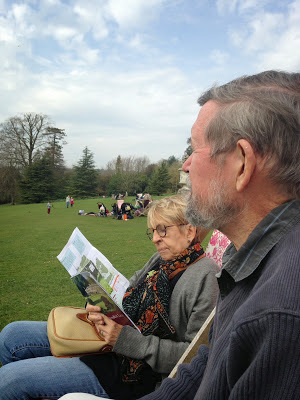
Jo ManningPolesden lacey April 2015
Click here to read a 2012 Daily Mail article about the brouhaha surrounding pheasant shooting rights on the Estate.

Polesden Lacey, the Edwardian country estate on a spectacular natural site overlooking a deep valley in Great Bookham, near Dorking, in Surrey, is best known for its influential hostess-with-the-mostest, Mrs Ronald Greville (aka “Mrs Ronnie”), who was an intimate of the royal family and anyone else who could claim to be anyone at the turn of the 20thcentury.
But it actually has a very long history dating back to Roman times – and, indeed, would it not have been a perfect site for a Roman temple? – though documentation of buildings on that site date back only to the 14thcentury or thereabouts.
One of Oliver Cromwell’s roundhead officers – the Parliamentarians who fought against the Cavalier forces of King Charles I in the English Civil War – bought this divine property in 1630, keeping the existing farm and constructing a new residence in situ.

The Regency-era playwright Richard Brinsley Sheridan – after a long line of other owners and leaseholders – came into the picture in 1797, when his trustees, one Lord Grey and a Mr Whitbread, bought the Polesden Lacey lease for 12,384 pounds, using the 8,000 pound dowry of Sheridan’s second wife, Hester Jane Ogle, and money raised from the sale of shares in the Drury Lane Theatre, which he owned. (another source stated a higher price of 20,000 pounds was paid.)

The Rivals and The School for Scandal are Sheridan’s best-known plays, still widely performed today. In my opinion, the world lost a literate and witty wordsmith when Sheridan decided to enter the world of Whig politics, but there was perhaps another motive to his service in parliament. As an MP he was safe against arrest for debt, and the playwright was chronically in debt. When he lost his seat in 1812 his creditors showed up in droves to claim what was owed them. Hence the loss of Polesden Lacey after a leasehold that spanned almost twenty years.
 The breathtakingly beautiful Elizabeth Lynley, from the painting by Thomas Gainsborough. Elizabeth was from a very well-known family of musicians in Bath with whom the painter was extremely friendly; he painted many family members.
The breathtakingly beautiful Elizabeth Lynley, from the painting by Thomas Gainsborough. Elizabeth was from a very well-known family of musicians in Bath with whom the painter was extremely friendly; he painted many family members.
This sympathetic piece in the theatrehistory.com website sums him up:
“The real sheridan was not a pattern of decorous respectabilty, but we may fairly believe that he was very far from being the Sheridan of vulgar legend. Against stories about his reckless management of his affairs we must set the broad facts that he had no source of income but the Drury Lane Theatre, that he bore from it for thirty years all the expenses of a fashionable life, and the theatre was twice rebuilt during his proprietorship, the first time (1791) on account of its having been pronounced unsafe, and the second (1809) after a disastrous fire. Enough was lost in this way to account ten times over for all his debts. The records of his wild bets in the betting book of Brooks’ Club date from the years after the loss, in1792, of his first wife [the incomparable beauty Elizabeth Lynley] … the reminiscences of his son’s tutor, Mr Smyth, show anxious and fidgetty [sic] family habits curiously at variance with the accepted tradition of his imperturbable recklessness. He died on the 7thof July 1816, and was buried with great pomp in Westminster Abbey.”
If you are so inclined, you can pay Sheridan a visit in the Poets’ Corner at Westminster Abbey the next time you are in London:

Although Sheridan began to demolish parts of the house around 1814, he did not get very far owing to burgeoning ill health and those always-problematic finances. He is credited, however, with extending the charming Long Walk to 1,300 feet from 900 feet. This walk was first laid out along the valley in 1761 on the 1,400 acre estate and it remains a very popular hiking trail with national trust visitors from far and wide as well as with local families and walking groups. Parallel to the Long Walk is another, called the Nun’s Walk, which is lined with beech, yew, and holly trees. (And, yes, for those of you who like to know these things, there is even a ha-ha, below a yew hedge that marks the garden’s boundary.)

Sheridan also made some attempts at landscaping the Polesden Lacey garden. In respect to that garden – and to his legendary reputation as a ladies’ man – the National Trust booklet attributes this quote to him: “Won’t you come into the garden? I would like my roses to see you.” Sheridan to a beautiful female guest at Polesden Lacey
The text in that booklet emphasizes how much Sheridan loved his country home, which he called “the nicest place, within a prudent distance of town, in England.” Notwithstanding his creditors, and the dual responsibilities of managing the Drury Lane Theatre and his parliamentary duties, he surely relished his role of country landlord and entertained, as they say, lavishly.
 This “portrait of a gentleman”, by John Hoppner, has been traditionally identified as that of Richard Brinsley Sheridan
This “portrait of a gentleman”, by John Hoppner, has been traditionally identified as that of Richard Brinsley SheridanBut, alas, the property was sold again, to a Joseph Bonsor (1768-1835), who commissioned the period’s master builder, Thomas Cubitt, to design and erect a new house, and this redesign formed the nexus of the current stately home. According to Bonsor’s obituary in The Gentleman’s Magazine , he was a self-made man, “the founder of his own fortune.” His success in the wholesale stationery trade enabled him to secure the sale of Polesden Lacey from Sheridan’s son in 1818.
Thomas Cubitt rebuilt the house in the neo-classical style. On the south front of the house, part of Cubitt’s villa is still visible: six bay windows with an Ionic-columned portico.
 Some repairs taking place recently on the neo-classical south front of Polesden Lacey (what you don’t see is the graffiti chalked by schoolchildren on the steps leading to the great lawn)
Some repairs taking place recently on the neo-classical south front of Polesden Lacey (what you don’t see is the graffiti chalked by schoolchildren on the steps leading to the great lawn)
The next owner in line was a prominent Scottish physician (and, yes, a Scots theme runs through this history) named Sir Walter Farquahar. It was this good doctor who extended the walled garden and put more order into the various plantings. But more was to come for this splendid parcel of land.
In 1902 the estate became the property of Sir Clinton Dawkins, who commissioned the architect Sir Ambrose Macdonald Poynter, a major London architect whose grandfather was also an architect (a co-founder of the Institute of British Architects whose father was a distinguished painter) to make extensive renovations to Polesden Lacey. He went on to build the Royal Over-Seas League, Park Place, St James’s, a few years later.
And then, in 1906, along came the redoubtable Mrs Greville… who employed the architectural firm of Mewes and Davis (the designers of the Ritz Hotel in London) and the interior decorating firm of white, Allom & Co., to further gild the lily this house was becoming. (See below for the changes and expansions from the 1903 house to the present-day.)

 This gives an even better idea of the expansion!
This gives an even better idea of the expansion!Some family background… Margaret Helen Anderson was born out of wedlock in 1863 to a Scottish brewery multimillionaire named William Mc Ewan and a woman named Helen Anderson. Mrs Anderson was said to be married to – or lived with – a man named William Anderson, who was a porter employed in Mc Ewan’s brewery. Mrs Anderson and Mr Mc Ewan wed after the death of Mr Anderson in1885. On Mc Ewan’s death in 1913, Margaret inherited his entire estate, becoming one of the wealthiest women in Britain.
 This gorgeous portrait (above) painted in 1891 by Carolus-Duran (who was John Singer Sargent’s teacher) sits on the landing of the central hall, on the way to the dining room… exactly where MrsGgreville loved to make a dramatic entrance and meet her guests as they went in to dinner…
This gorgeous portrait (above) painted in 1891 by Carolus-Duran (who was John Singer Sargent’s teacher) sits on the landing of the central hall, on the way to the dining room… exactly where MrsGgreville loved to make a dramatic entrance and meet her guests as they went in to dinner…Margaret had been married in 1891 to the Honorable Ronald Henry Fulke Greville, a handsome gentleman identified as “a member of the racy Marlborough House set” who was said to have been “witty and good-natured.” Photos show him with a rakish moustache and piercing light blue eyes. He was the eldest son of the 2nd Lord Greville and a conservative MP for Bradford as well as a Captain in the 1st Life Guards. Greville and Margaret were, by all accounts, happily wed for seventeen years, until he died suddenly from complications of an emergency operation. She never remarried, though, as an immensely wealthy widow she probably had a number of men desirous of being in her company.
Why is this National Trust property, Polesden Lacey, important?
Well, for one, it is so closely associated with events in British history and with prominent historic personages – like Sheridan, like the assorted royals and foreign visitors with whom the Grevilles interacted – and Mrs Greville herself was an amazing character whose talent lay in bringing people together in an intimate salon setting and who was said to have had a remarkably sharp and witty tongue.
We would, I think, like to know much more about what she thought about what and whom, living through those two horrific world wars that upended British society as she had known it, but, as all of her personal letters, diaries and other papers were destroyed after her death, at her request...
One can be sure. then that the many things that swirled about her, all the racy and intriguing political/private/scandalous goings-on/et al., of the Edwardian era and the reign of King George VI (father to the present Queen, Elizabeth II) will never see her viewpoint’s light of day. It was too bad, because as an intimate of so many well-connected and powerful people, she was in a position to hear and see a great many things that could be illuminating, even obliquely.
She was, for one, very close to Elizabeth, the Queen Mother – Elizabeth and George VII (before he became king) spent part of their honeymoon at Polesden Lacey -- and Mrs Greville left the Queen Mother and her daughters the Princesses Elizabeth and Margaret, her most precious jewels…one a diamond necklace purported to have been owned by the French Queen Marie Antoinette.

The widely-held expectation, in fact, was that she was going to leave Polesden Lacey to the House of Windsor in her will. (She and Ronald had no children.) However, she did not do that, gifting it to the National Trust instead.
(For those who want to know and see a little more than can be covered in this piece, there is an extensively-illustrated biography, published by the National Trust in 2013, written by Sian Evans: Mrs Ronnie: The Society Hostess Who Collected Kings. )
 The Paterson Children, by Sir Henry Raeburn
The Paterson Children, by Sir Henry RaeburnOne of the outstanding collections amongst the many exquisite and valuable collections at Polesden Lacey that I must mention hearkens back to that Scottish connection I mentioned previously, and those are the remarkable paintings in the dining room, many of them by the Scottish portraitists Sir Henry Raeburn (a favorite of King George IV), Allan Ramsay (a favorite of King George III), and by other Scots of lesser renown.
So, again, what is so special about Polesden Lacey?
Along with the above glorious paintings (and the fabulous collections of miniature paintings, ceramics, etc., and Polesden Lacey’s place in history and association with historical personages, it is also (and this is not such a minor thing), as the National Trust describes it:
“an English estate in the traditional manner – a blend of open lawns and enclosed rose gardens, mature native trees and exotic species from overseas, formal terraces and informal shrubs.... An appealing yet practical complete landscape.”
And this is very true:
“the estate was bought by successive owners because it was beautiful… but…its maintenance was only possible because of Mrs Greville’s considerable personal fortune.”
We must not forget that we visitors (including this child from London pictured below and the many families lounging on deck chairs in the background and those walking all the beautiful trails) are much the richer for it, as its maintenance – keeping it beautiful – was possible only because of Mrs Ronnie’s considerable personal fortune and her concern for future generations. It’s in trust for everyone in Britain and all should be very grateful it passed on to the people of Britain and not to the royal family of Windsor.


Jo ManningPolesden lacey April 2015
Click here to read a 2012 Daily Mail article about the brouhaha surrounding pheasant shooting rights on the Estate.
Published on June 30, 2015 23:30
June 28, 2015
STAY A WHILE AT HISTORIC COMBERMERE ABBEY

The Duke of Wellington was Godfather to the 2nd son of Viscount Combermere and attended his Christening in 1820, when he planted an oak tree in celebration of the event. Now, guests can stay in accommodations on the grounds and enjoy full access the property and historic gardens.
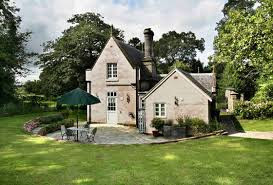
Stone Lodge ~
A Whole Estate to Explore in your ‘back garden’!
Combermere Estate lies on the Cheshire/Shropshire border and features a 143 acre lake, the largest in private ownership in Cheshire, and a total of 1,000 rolling acres. The medieval Cistercian Combermere Abbey is set in the heart of the Estate and was founded in 1133 by Hugh de Malbanc, Lord of Nantwich. It once had 22 monks in residence. During the Dissolution of the Monasteries in 1536 by Henry VIII, most of the monastic buildings were destroyed leaving only the Abbot’s Hall and in 1820 it was re-designed as a gothic mansion.
Famous occupants of Combermere Abbey include Elizabeth, Empress of Austria; William of Orange, Dr. Johnson and Mrs Thrale and Sir Stapleton Cotton, a brilliant General, who fought under Wellington at the Battle of Salamanca. The present occupants are Sarah Callander Beckett, who inherited the estate from her great grandfather, Sir Kenneth Crossley Bt, and her husband, Peter.
The North Wing of the Abbey is currently undergoing major restoration, following the successful enabling development award in 2013. The project will see the complete repair of the wing and transformation into a separate dwelling which will be offered as the bridal suite for wedding couples. The restoration is expected to complete in 2016.
In 1994, the restored 1837 Stables were opened as luxury holiday cottages and have since won awards and acclaim for their high standards. In 2011 the number of cottages was increased from 7 to 10, with the addition of three new stylish and contemporary cottages. The business was awarded a Gold Award from the Green Tourism Business Scheme and was Highly Commended at the inaugural Hudson’s Heritage Awards for their ‘Best Accommodation’ category.
‘Stone Lodge’, our Gothic-inspired hideaway is one of so many wonderful places, yet what sets this pretty detached cottage apart from the rest lies beyond the comfort of its stylish interiors, its own secluded damson orchard and sunny south-facing terrace - in fact the unique appeal and magic of this place starts perhaps a mile away from its front door………
A gatehouse to one of England’s most beautiful privately-owned historic estates, Combermere Abbey, Stone Lodge is set on the verdant borders of Shropshire and Cheshire. The C12th Abbey today is a family home, with its extensive grounds open occasionally to the public, and to play host to exclusive weddings, which take place within the formal walled gardens. Often cottage guests, free to explore these magnificent surroundings as part of their stay, have them all to themselves.
Largely untouched for centuries, the landscaped parklands surround a huge glacial mere, where walk ways following ancient ‘rides’ and woodlands are a haven of flora and fauna. Bird song abounds and the land surrounding the mere gives rise to wetland species such as grebe, kingfisher, heron, egret, cormorant, swans, ducks and geese, as well as the usual field and woodland birds. Frequently spotted mammals include hare, rabbit, mink, vole, dormice, squirrels, badger and foxes.
The Pleasure Gardens are found down by the mere, with swathes of native flowers studding the wooded paths under a canopy of Wellingtonia, Swamp Cypress and the aptly-named Tree of Heaven.
Garden lovers will adore the five and a half acres of Victorian Walled Gardens, which embrace the estate’s more formal landscaping. Highlights include The Geometric Garden, The Rose Garden, where many varieties have ecclesiastic names as a nod to their setting, abundant herbaceous borders and right in the heart of the walled gardens, the world’s only Fruit Tree Maze, a labyrinth of espaliered fruit trees, including apples, pears, redcurrants and gooseberries, truly a marvel to behold.
The maze was created by two gentlemen, Randoll Coate who had worked on some of the world’s most inspirational mazes and labyrinths, and whose expertise had been sought by many historic sites the world over, including the Vatican and San Georgio in Venice. At Combermere, Coate worked in tandem with fruit tree specialist, Bert Davis, giving rise to this unique planting medium and adding intrigue to the mythical symbolism within its design, such as the ‘Apple of the Eye’.
With this diversity of habitat, the sensory impact of these tranquil spaces and gardens restores one’s wellbeing and makes for a pleasurable. Have freedom to walk, amble, twitch, pause, stare, smell, languish and explore the most wonderful of natural surroundings.
Those with canine friends will particularly enjoy strolls through the woods and parklands where dogs can roam freely (we politely request leads for the more formal garden areas) There are also miles of public footpaths which cross the fields, leading to nearby villages.
Plan a natural and restorative retreat this summer at our beautiful estate. Stone Lodge is one of a collection of charming, deluxe cottages, set apart from the rest at the entrance to the estate and the others are the converted stables and coach house.
Book to stay midweek before the end of June and receive a 20% discount making a 3 night midweek stay only £360 (based on Stone Lodge and other cottages sleeping up to 4). A flat year-round pricing structure* ensures fabulous value all year long (*exc. Christmas and New Year)
Optional extras include locally-prepared ready meals, breakfast hampers, wines, spa treatments and the like. Make sure to sample the delicious local pub food at nearby Combermere Arms, just across from Stone Lodge. Bikes are available to borrow on site, as well as tennis rackets and balls. With so much to do and explore you can even give the car a rest too.
For those wishing to venture out, some of England’s most beautiful public gardens are waiting to be discovered only a short drive away – these include Arley Hall, Cholmondeley Castle, Wollerton Old Hall Garden, Bluebell Cottage Gardens, Dorothy Clive Gardens and Ness Botanic Gardens.
A warm welcome awaits at Combermere Abbey this summer.
Winner of Visit England ‘Self-Catering Holiday Provider of the Year, 2013’

For bookings contact: Ashleigh Taylorwww.stonelodgeatcombermere.co.ukwww.combermereabbey.co.ukcottages@combermereabbey.co.uk01948 660345Combermere Abbey, Whitchurch, Shropshire SY13 4 AJ twitter.com/combermereabbey.co.ukfacebook.com/combermereabbey
Published on June 28, 2015 23:30
June 26, 2015
AUTHOR FANNY BURNEY IN BRUSSELS IN 1815
The Foresight of Evil: Frances Burney and the Battle of Waterloo, 1815
A version of this post appeared in the Burmey Letter, Vol. 21, No. 1, a publication of The Burney Society, Spring 2015; by Victoria Hinshaw
“…upon reflection, I will write no account of these great events, which have been detailed so many hundred times, and so many hundred ways, as I have nothing new to offer upon them; I will simply write the narrative of my own history at that awful period.” With this modest declaration, Frances Burney, Madame D’Arblay, describes her famous account of Brussels during time leading up to, during, and after the Battle of Waterloo in 1815. In vivid terms, she chronicles the tension and anxiety felt by the helpless people waiting for their fate to be decided.
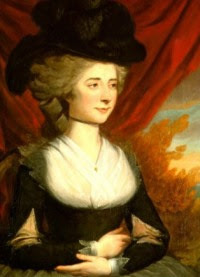 Frances Burney, 1782
Frances Burney, 1782General Alexandre d’Arblay (1748-1818), Burney’s beloved husband, even at the age of 66, served King Louis XVIII in his personal Guard. The d’Arblays occupied a residence in Paris, and had an active life there. But when Napoleon escaped from Elba in March 1815 and headed for Paris, assembling a powerful army as he came, Louis fled. He had been restored to the throne for just over a year and now abandoned Paris and crossed Belgian border to the relative safety of the United Netherlands. d’Arblay had to accompany the King, but he insisted his wife should accompany their friend the Princess d’Heinin into Belgium as well, not a simple task it turned outMany British families lived in Brussels at the time, having taken advantage of the Peace of 1814 to enjoy a stay on the continent, which they had been unable to visit during the Napoleonic Wars. Like most of the world, they were shocked when Napoleon Bonaparte suddenly returned to France; Paris was about 160 miles from Brussels. Once she reached Brussels, Madame d’Arblay found many friends among the French evacuees and the ex-pat English as well. When her husband was able to join her for several weeks, she was blissful. They even got to travel a bit and sightsee at the Palace of Lachen:“…my dearest friend (the General, her husband) indulged in one morning's recreation, which proved as agreeable as anything at such a period could be to a mind oppressed like mine. He determined that we should visit the Palais de Lachen, which had been the dwelling assigned as the palace for the Empress Josephine by Bonaparte at the time of his divorce. My dearest husband drove me in his cabriolet, and the three gentlemen whom he invited to be of the party accompanied us on horseback. The drive, the day, the road, the views, our new horses-all were delightful, and procured me a short relaxation from the foresight of evil.“The Palace of Lachen was at this moment wholly uninhabited, and shown to us by some common servant. It is situated in a delicious park d'Anglaise, and with a taste, a polish, and an elegance that clears it from the charge of frippery or gaudiness, though its ornaments and embellishments are all of the liveliest gaiety. There is in some of the apartments some Gobelin tapestry, of which there are here and there parts and details so exquisitely worked that I could have ‘hung over them enamoured.’"While together, the couple also had the opportunity of attending a concert at which they observed the Duke of Wellington, Commander of the Allied Armies. “Our last entertainment here was a concert in the public and fine room appropriated for music or dancing. The celebrated Madame Catalani had a benefit, at which the Queen of the Netherlands was present, not, however, in state, though not incognita; and the king of warriors, Marshal Lord Wellington, surrounded by his staff and all the officers and first persons here, whether Belgians, Prussians, Hanoverians, or English. I looked at Lord Wellington watchfully, and was charmed with every turn of his countenance, with his noble and singular physiognomy and his eagle eye. He was gay even to sportiveness all the evening, conversing with the officers around him. He never was seated, not even a moment, though I saw seats vacated to offer to him frequently. He seemed enthusiastically charmed with Catalani, ardently applauding whatsoever she sung, except the "Rule Britannia”; and there, with sagacious reserve, he listened in utter Silence. Who ordered it I know not, but he felt it was injudicious in every country but our own to give out a chorus of ‘Rule, Britannia! Britannia, rule the waves!’“And when an encore began to be vociferated from his officers, he instantly crushed it by a commanding air of disapprobation, and thus offered me an opportunity of seeing how magnificently he could quit his convivial familiarity for imperious dominion when occasion might call for the transformation.”
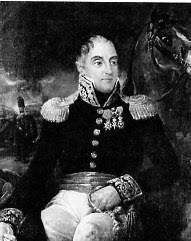 General Alexandre d'Arbly
General Alexandre d'ArblyThe d’Arblay’s idyll ended when the General was sent off to Luxembourg to recruit soldiers for the royal cause. Frances was left alone to worry and share the concerns of her friends, some bordering on hysteria, as tension steadily increased in the next few weeks. Everyone knew the battle was approaching.“May 13, 1815. My best friend left me to begin his campaign; left me, by melancholy chance, upon his birthday (67th). I could not that day see a human being -- I could but consecrate it to thoughts of him who had just quitted me yet who from me never was, never can be, mentally absent , and to our poor Alexander (their son), thus inevitably, yet severely cast upon himself.”For the month following his departure, she visited with friends, strolled in the park, attended church, and observed everything with her keen eye for detail. She also spent many hours alone, writing and worrying about her son, not doing as well at Cambridge as his parents expected, and particularly about her husband.One of Burney’s most fascinating observations was her view of the Belgian people, for the most part stoic and phlegmatic. As she observed, they had been traded back and forth between warring factions for centuries, spending most of the last decade as part of Napoleon’s Empire. How indeed could they get excited about another change in status? They seemed placidly to accept their fate, to Frances’s incredulity and sometimes consternation. But even in the midst of the unconcerned populace, tensions rose as the streets were crowded with military vehicles horses and soldiers everywhere. She had a near-encounter with the notorious Lady Caroline Lamb*, whose affair with Byron had shocked London. Burney writes, “…I just missed meeting the famous Lady Caroline Lamb … whom I saw crossing the Place Royale,… dressed, Or rather not dressed, so as to excite universal attention, and authorise every boldness of staring, from the general to the lowest soldier, among the military groups then constantly parading the Place, -- for she had one shoulder, half her back, and all her throat and neck, displayed as if at the call of some statuary for modelling a heathen goddess. A slight scarf hung over the other shoulder, and the rest of the attire was of accordant lightness. As her ladyship had not then written, and was not, therefore, considered as one apart, from being known as an eccentric authoress, this conduct and demeanour excited something beyond surprise, and in an English lady provoked censure, if not derision, upon the whole English nation.”Aside from amusement at Burney’s disapproval of the attire, it is interesting to speculate about whether she thought of herself as an “eccentric author” and thus “beyond surprise.”This was a time of considerable unease for her. “During this melancholy period when leisure, till now a delight, became a burthen to me, I could not call my faculties into any species of intellectual service; all was sunk, was annihilated in the overpowering predominance of anxiety for the coming event…”We take up Burney’s account of Brussels again on the day of the Battle of Quatre Bras. “I was again awakened at about five o'clock in the morning Friday, 16th June, by the sound of a bugle in the March aux Bois: I started up and opened the window. But I only perceived some straggling soldiers, hurrying in different directions, and saw lights gleaming from some of the chambers in the neighbourhood: all again was soon still, and my own dwelling in profound silence, and therefore I concluded there had been some disturbance in exchanging sentinels at the various posts, which was already appeased: and I retired once more to my pillow, and remained till my usual hour… (Later) “… my ears were alarmed by the sound of military music, and my eyes equally struck with the sight of a body of troops marching to its measured time. But I soon found that what I had supposed to be an occasionally passing troop, was a complete corps; infantry, cavalry artillery, bag and baggage, with all its officers in full uniform, and that uniform was black.... I learned it was the army of Brunswick. How much deeper yet had been my heartache had I foreknown that nearly all those brave men, thus marching on in gallant though dark array, with their valiant royal chief at their head, the nephew** of my own king, George III., were amongst the first destined victims to this dreadful contest, and that neither the chief, nor the greater part of his warlike associates, would within a few short hours, breathe again the vital air!...“What a day of confusion and alarm did we all spend on the 17th!...That day, and June 18th, I passed in hearing the cannon! Good heaven! what indescribable horror to be so near the field of slaughter! such I call it, for the preparation to the ear by the tremendous sound was soon followed by its fullest effect, in the view of the wounded, the bleeding martyrs to the formidable contention that was soon to terminate the history of the war. And hardly more afflicting was this disabled return from the battle, than the sight of the continually pouring forth ready-armed and vigorous victims that marched past my windows to meet similar destruction.”
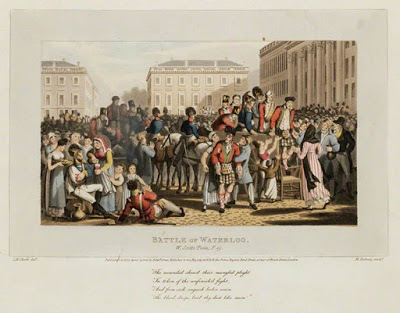 The Wounded Arriving in Brussels. 1815
The Wounded Arriving in Brussels. 1815Many offers of escort out of Brussels were discussed and several attempted but none were successful. The military had confiscated all vehicles and barges destined for the roads and canals to Antwerp or Ostend. Amidst reports on her conversations with those trying to escape, “I found upon again going my rounds for information, that though news was arriving incessantly from the scene of action, and with details always varying, Bonaparte was always advancing…Yet no clamour, no wrangling, nor even debate was intermixed with either question or answer; curiosity, though incessant, was serene; the faces were all monotony, though the tidings were all variety. I could attribute this only to the length of time during which the inhabitants had been habituated to change both of masters and measures, and to their finding that, upon an average, they neither lost nor gained by such successive revolutions…No love of liberty buoyed up resistance; no views of independence brightened their imagination; and they bore even suspense with the calm of apparent philosophy, and an exterior of placid indifference.”These are just a few of her observations, but I have attempted to choose the most relevant ones. At last, we come to the day of the main battle.“But what a day was the next — June 18th — the greatest, perhaps, in its result, in the annals of Great Britain!...” Despite the streets full of people, “when every other hour changed the current of expectation, no one could be inquisitive without the risk of passing for a spy, nor communicative without the hazard of being suspected as a traitor…”Her friend Mr. Boyd “…feared all was lost-that Bonaparte was advancing-that his point was decidedly Brussels-and that the Duke of Wellington had sent orders that all the magazines, the artillery, and the warlike stores of every description, and all the wounded, the maimed, and the sick, should be immediately removed to Antwerp. For this purpose he had issued directions that every barge, every boat should be seized…” “The dearth of any positive news from the field of battle, even in the heart of Brussels, at this crisis, when everything that was dear and valuable to either party was at stake, was at one instant nearly distracting in its torturing suspense to the wrung nerves, and at another insensibly blunted them into a kind of amalgamation with the Belgic philosophy. At certain houses, as well as at public offices, news, I doubt not, arrived; but no means were taken to -- promulgate it -- no gazettes, as in London, no bulletins, as in Paris, were cried about the streets; we were all left at once to our conjectures and our destinies.”… “What a dreadful day did I pass! dreadful in the midst of its glory! for it was not during those operations that sent details partially to our ears that we could judge of the positive state of affairs, or build upon any permanency of success. Yet here I soon recovered from all alarm for personal safety, and lost the horrible apprehension of being in the midst of a city that was taken, sword in hand, by an enemy -- an apprehension that, while it lasted, robbed me of breath, chilled my blood, and gave me a shuddering ague that even now in fancy returns as I seek to commit it to paper.”Eventually Burney heard an account from a witness to the battle; (Mr. Saumarez’s) “…narration was all triumphant and his account of the Duke of Wellington might almost have seemed an exaggerated panegyric if it had painted some warrior in a chivalresque romance. . . . I could not but be proud of this account: independent from its glory; my revived imagination hung the blessed laurels of peace. But though Hope was all alive, Ease and Serenity were not her companions: Mr. Saumarez could not disguise that there was still much to do, and consequently to apprehend; and he had never, he said, amongst the many he had viewed, seen a field of battle in such excessive disorder. Military carriages of all sorts, and multitudes of groups unemployed, occupied spaces that ought to have been left for manoeuvring or observation. I attribute this to the various nations who bore arms on that great day in their own manner; though the towering generalissimo of all cleared the ground, and dispersed what was unnecessary at every moment that was not absorbed by the fight.”As she returned to her lodging, “Three or four shocking sights intervened during my passage, of officers of high rank, either English or Belge, and either dying or dead, extended upon biers, carried by soldiers. The view of their gay and costly attire, with the conviction of their suffering, or fatal state, joined to the profound silence of their bearers and attendants, was truly saddening ; and if my reflections were morally dejecting, what, oh what were my personal feelings and fears, in the utter uncertainty whether this victory were more than a passing triumph!”Though confident of victory, no one knew at the moment that for all practical purposes, Napoleon’s reign was over and peace would soon be restored to Europe.
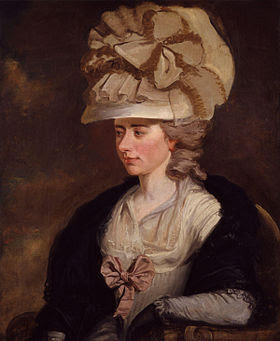 Frances Burney, Madame d'Arblay,
Frances Burney, Madame d'Arblay, “It was not till Tuesday, the 20th, I had certain and satisfactory assurances how complete was the victory. At the house of Madame de Maurville I heard confirmed and detailed the matchless triumph of the matchless Wellington, interspersed with descriptions of scenes of slaughter on the field of battle to freeze the blood, and tales of woe amongst mourning survivors in Brussels to rend the heart. While listening with speechless avidity to these relations, we were joined by M. de la Tour du Pin, who is a cousin of Madame de Maurville, and who said the Duke of Wellington had galloped to Brussels from Wavre to see the Prince of Orange and inquire in person after his wounds. Prince Blucher was in close pursuit of Bonaparte, who was totally defeated, his baggage all taken, even his private equipage and personals, and who was a fugitive himself, and in disguise! The duke considered the battle to be so decisive, that while Prince Blucher was posting after the remnant of the Bonapartian army, he determined to follow himself as convoy to Louis XVIII.”Even so, the ordeal of Brussels and its inhabitants was not finished. Burney writes, “The duke now ordered that the hospitals, invalids, magazines, etc., should all be stationed at Brussels, which he regarded as saved from invasion and completely secure. It is not near the scene of battle that war, even with victory, wears an aspect of felicity-no, not even in the midst of its highest resplendence of glory…For more than a week from this time I never approached my window but to witness sights of wretchedness. Maimed, wounded, bleeding, mutilated, tortured victims of this exterminating contest passed by every minute: the fainting, the sick, the dying and the dead, on brancards, in carts, in waggons, succeeded one another without intermission. There seemed to be a whole and a large army of disabled or lifeless soldiers! All that was intermingled with them bore an aspect of still more poignant horror ; for the Bonapartian Prisoners who were now poured into the city by hundreds…”“…Everybody was wandering from home; all Brussels seemed living in the streets. The danger to the city, which had imprisoned all its inhabitants except the rabble or the military, once completely passed, the pride of feeling and showing their freedom seemed to stimulate their curiosity in seeking details on what had passed and was passing. But neither the pride nor the joy of victory was anywhere of an exulting nature.”She heard stories from participants, but nothing could quell her horror. “I met at the embassy an old English officer who gave me most interesting and curious information, assuring me that in the carriage of Bonaparte, which had been seized, there were proclamations ready printed, and even dated from the palace of Lachen, announcing the downfall of the Allies and the triumph of Bonaparte ! But no satisfaction could make me hear without deadly dismay and shuddering his description of the field of battle. Piles of dead! — Heaps, masses, hills of dead bestrewed the plains!”In Brussels, “Thousands, I believe I may say without exaggeration, were employed voluntarily at this time in Brussels in dressing wounds and attending the sick beds of the wounded. Humanity could be carried no further; for not alone the Belgians and English were thus nursed and assisted, nor yet the Allies, but the prisoners also; and this, notwithstanding the greatest apprehensions being prevalent that the sufferers, from their multitude, would bring pestilence into the heart of the city.”Frances Burney, Madame d’Arbly, remained in Brussels for almost a month after the battle. She learned that the wars were over on June 26. “We were all at work more or less in making lint. For me, I was about amongst the wounded half the day, the British, s'entend! The rising in France for the honour of the nation now, and for its safety in independence hereafter, was brilliant and delightful…”“On the following Sunday I had the gratification of hearing, at the Protestant chapel, the Te Deum for the grand victory, in presence of the King and Queen of the Low Countries — or Holland, and of the Dowager Princess of Orange, and the young warrior her grandson. This prince looked so ill, so meagre, so weak, from his half-cured wounds, that to appear on this occasion seemed another, and perhaps not less dangerous effort of heroism, added to those which had so recently distinguished him in the field…” These are only a portion of Frances Burney’s memoirs of the period. They were chosen from the on-line version of the Diary and Letters of Madame d’Arblay edited by her Niece Charlotte Barrett, volume IV, available on Google Books. Also used was Fanny Burney: Selected letters and Journals edited by Joyce Hemlow, published in 1986.A postscript to her time in Belgium was Madame d‘Arblay’s audacious journey to reach her husband in July, 1815. While still in the King’s service, he had been injured by the kick of a horse, a wound to his leg from which he never fully recovered. Alone and without complete papers and passports, she set out from Brussels, determined to get to him. Traveling conditions in the region were disrupted and confusing, but she was intrepid and eventually, she was reunited with “her best friend.” Over the next few weeks, while she nursed him, they assembled their belongings in Paris, secured his release from the King’s service, and returned to England. The d’Arblays took up residence in Bath, there the general died in May, 1818.
*Lady Caroline Lamb (1785-1828) was the daughter of the 3rd Earl of Bessborough and his wife Harriet/Henrietta; niece of Georgiana, Duchess of Devonshire; wife of Frederick Lamb, future Lord Melbourne and future Prime Minister. Lady Caroline‘s brother Frederick Ponsonby of the 12thLight Dragoons, was severely wounded in the Battle of Waterloo. She published her first novel, a roman a clef about Byron, in 1816.
**Frederick William, Duke of Brunswick-Wolfenbuttel (1771-16 June 1815), known as The Black Duke, was also the sister of the Prince Regent’s wife Caroline of Brunswick; he died at the Battle of Quatre Bras.
Frances Burney (1752-1840) wrote four novels, many plays, and her renowned Journals, currently being re-issued. For more information on Fanny and her family, visit the website of The Burney Centre at McGill University, Montreal, here.
Published on June 26, 2015 00:30
June 23, 2015
CAPTAIN LINNAEUS TRIPE: PHOTOGRAPHER OF INDIA AND BURMA 1852 - 1860
Captain Linnaeus Tripe: Photographer of India and Burma, 1852-1860
Part of the V&A India Festival 24 June – 11 October 2015
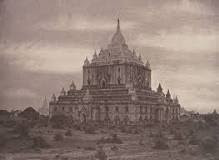
www.vam.ac.uk/linnaeustripe| #LinnaeusTripe Captain Linnaeus
Tripe (1822-1902) was a pioneer of early photography who created an outstanding body of work depicting the landscape and architecture of India and Burma (now Myanmar) in the 1850s. This major presentation of Tripe’s photographs will include more than 60 of his most striking views taken between 1852 and 1860.
On display will be Tripe’s photographs of architectural sites and monuments, ancient and contemporary religious and secular buildings, as well as roads, bridges, moats, landscape vistas and geological formations throughout India and Burma. Many of the images are the first photographic records of these sites and the prints on view represent the highlights of Tripe’s output. They will be shown alongside bound albums of his work, a panoramic scroll and two models of monuments similar to his subjects.
Linnaeus Tripe was born in 1822 in Devon, the ninth of 12 children, joining the East India Company army in 1839 and stationed in India throughout the 1840s. He learned to photograph during several years on leave in England in the early 1850s. The exhibition will highlight Tripe’s considerable skill at a time when photography was about to undergo rapid change and the practice and recognition was becoming more widely adopted. It will also show his understanding that photography could be used to convey information about unknown cultures and places to the general public.
The photographs on view represent two major expeditions and preserve an important period in Indian, Burmese and British history. In 1855 Tripe was appointed by the governor-general of India to accompany a mission to Burma to study the area. Here Tripe became the first person to photograph the region’s remarkable architecture and landscapes. He then went on to be the first to photograph extensively in south India after his subsequent appointment as photographer to the Madras government. Through this official role Tripe aimed to capture as much of the south Indian region as possible. After each trip he returned with more than 200 large format paper negatives, from which he carefully oversaw the complex printing in his Bangalore studio that he founded for this purpose. Amerapoora: Colossal Statue of Gautama Close to the North End of the Wooden Bridge, 1855, Collection of Charles Isaacs and Carol Nigro Tripe’s photographs are technically complex and he is known for his innovative precision with the camera, paying close attention to both his composition and its realisation when printing.
To evoke atmospheric effects Tripe retouched most of his negatives by applying pigment in thin layers and included in the exhibition will be a selection of waxed-paper negatives that reveal these working methods. Also on display will be a segment of a panoramic scroll showing the inscriptions around the base of the Great Pagoda temple in Tanjore. Composed of more than 20 prints assembled and mounted onto a long canvas scroll, it is now regarded as a considerable technical achievement, given the physical and climatic conditions of the time.
Captain Linnaeus Tripe: Photographer of India and Burma, 1852-1860 is organized jointly by the National Gallery of Art, Washington and and the Metropolitan Museum of Art, New York, in association with the V&A. It includes photographs from the collections of the National Gallery of Art, the Metropolitan Museum, the British Library and many private lenders, as well as photographs and objects from the V&A’s own extensive collection of Tripe’s works.
For more information, visit the V and A website here.
Published on June 23, 2015 23:30
June 22, 2015
SIR WALTER SCOTT AT WATERLOO
This post was originally posted here on June 15, 2011
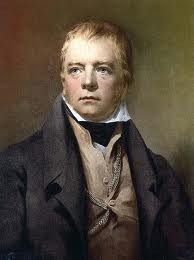 Sir Walter Scott
Sir Walter ScottFrom Memoirs of the Life of Sir Walter Scott by John Gibson Lockhart (1838)
I found the letter in question preserved among Scott's papers, I perused it with a peculiar interest; and I now venture, with the writer's permission, to present it to the reader. It was addressed by Sir Charles Bell to his brother, an eminent barrister in Edinburgh, who transmitted it to Scott. "When I read it," said he, "it set me on fire." The marriage of Miss Maclean Clephane of Torloisk with the Earl of Compton (now Marquis of Northampton), which took place on the 24th of July, was in fact the only cause why he did not leave Scotland instantly; for that dear young friend had chosen Scott for her guardian, and on him accordingly devolved the chief care of the arrangements on this occasion. The extract sent to him by Mr George Joseph Bell is as follows:—
"Brussels, 2d July, 1815.
"This country, the finest in the world, has been of late quite out of our minds. I did not, in any degree, anticipate the pleasure I should enjoy, the admiration forced from me, on coming into one of these antique towns, or in journeying through this rich garden. Can you recollect the time when there were gentlemen meeting at the Cross of Edinburgh, or those whom we thought such? They are all collected here. You see the very men, with their scraggy necks sticking out of the collars of their old-fashioned square-skirted coats— their canes—their cocked-hats; and, when they meet, the formal bow, the hat off to the ground, and the powder flying in the wind. I could divert you with the odd resemblances of the Scottish faces among- the peasants, too—but I noted them at the time- with my pencil, and I write to you only of things that you won't find in my pocket-book.
"I have just returned from seeing the French wounded received in their hospital; and could you see them laid out naked, or almost so—100 in a row of low beds on the ground—though wounded, exhausted, beaten, you would still conclude with me that these were men capable of marching unopposed from the west of Europe to the east of Asia. Strong, thickset, hardy veterans, brave spirits and unsubdued, as they cast their wild glance upon you,—their black eyes and brown cheeks finely contrasted with the fresh sheets,—you would much admire their capacity of adaptation. These fellows are brought from the field after lying many days on the ground; many dying—many in the agony—many miserably racked with pain and spasms; and the next mimicks his fellow, and gives it a tune,—Aha, vous chantez bien! How they are wounded you will see in my notes. But I must not have you to lose the present impression on me of the formidable nature of these fellows as exemplars of the breed in France. It is a forced praise; for from all I have seen, and all I have heard of their fierceness, cruelty, and bloodthirstiness, I cannot convey to you my detestation of this race of trained banditti. By what means they are to be kept in subjection until other habits come upon them, I know not; but I am convinced that these men cannot be left to the bent of their propensities.
"This superb city is now ornamented with the finest groupes of armed men that the most romantic fancy could dream of. I was struck with the words of a friend —E.: 'I saw,' said he, 'that man returning from the field on the 16th.'—(This was a Brunswicker of the Black or Death Hussars.)—' He was wounded, and had had his arm amputated on the field. He was among the first that came in. He rode straight and stark upon his horse—the bloody clouts about his stump—pale as death, but upright, with a stern, fixed expression of feature, as if loth to lose his revenge.' These troops are very remarkable in their fine military appearance; their dark and ominous dress sets off to advantage their strong, manly, northern features and white mustachios; and there is something more than commonly impressive about the whole effect."This is the second Sunday after the battle, and many are not yet dressed. There are 20,000 wounded in this town, besides those in the hospitals, and the many in the other towns ;—only 3000 prisoners; 80,000, they say, killed and wounded on both sides."
I think it not wonderful that this extract should have set Scott's imagination effectually on fire; that he should have grasped at the idea of seeing probably the last shadows of real warfare that his own age would afford; or that some parts of the great surgeon's simple phraseology are reproduced, almost verbatim, in the first of "Paul's Letters to his Kinsfolk."
. . . . . At Brussels, Scott found the small English garrison left there in command of Major-General Sir Frederick Adam, the son of his highly valued friend, the present Lord Chief Commissioner of the Jury Court in Scotland. Sir Frederick had been wounded at Waterloo, and could not as yet mount on horseback ; but one of his aides-de-camp, Captain Campbell, escorted Seott and his party to the field of battle, on which occasion they were also accompanied by another old acquaintance of his, Major Pryse Gordon, who being then on halfpay, happened to be domesticated with his family at Brussels. Major Gordon has since published two lively volumes of " Personal Memoirs;" and Gala bears witness to the fidelity of certain reminiscences of Scott at Brussels and Waterloo, which occupy one of the chapters of this work. I shall, therefore, extract the passage.
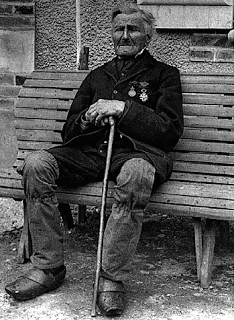 Louis-Victor Baillot, last French veteran of Waterloo"Sir Walter Scott accepted my services to conduct him to Waterloo: the General's aide-de-camp was also of the party. He made no secret of his having undertaken to write something on the battle; and perhaps he took the greater interest on this account in every thing that he saw. Besides, he had never seen the field of such a conflict; and never having been before on the Continent, it was all new to his comprehensive mind. The day was beautiful; and I had the precaution to send out a couple of saddle-horses, that he might not be fatigued in walking over the fields, which had been recently ploughed up. In our rounds we fell in with Monsieur de Costar, with whom he got into conversation. This man had attracted so much notice by his pretended story of being about the person of Napoleon, that he was of too much importance to be passed by: I did not, indeed, know as much of this fellow's charlatanism at that time as afterwards, when I saw him confronted with a blacksmith of La Belle Alliance, who had been his companion in a hiding-place ten miles from the field during the whole day; a fact which he could not deny. But he had got up a tale so plausible and so profitable, that he could afford to bestow hush-money on the companion of his flight, so that the imposition was but little known; and strangers continued to be gulled. He had picked up a good deal of information about the positions and details of the battle; and being naturally a sagacious Wallon, and speaking French pretty fluently, he became the favourite cicerone, and every lie he told was taken for gospel. Year after year, until his death in 1824, he continued his popularity, and raised the price of his rounds from a couple of francs to five; besides as much for the hire of a horse, his own property; for he pretended that the fatigue of walking so many hours was beyond his powers. It has been said that in this way he realized every summer a couple of hundred Napoleons.
Louis-Victor Baillot, last French veteran of Waterloo"Sir Walter Scott accepted my services to conduct him to Waterloo: the General's aide-de-camp was also of the party. He made no secret of his having undertaken to write something on the battle; and perhaps he took the greater interest on this account in every thing that he saw. Besides, he had never seen the field of such a conflict; and never having been before on the Continent, it was all new to his comprehensive mind. The day was beautiful; and I had the precaution to send out a couple of saddle-horses, that he might not be fatigued in walking over the fields, which had been recently ploughed up. In our rounds we fell in with Monsieur de Costar, with whom he got into conversation. This man had attracted so much notice by his pretended story of being about the person of Napoleon, that he was of too much importance to be passed by: I did not, indeed, know as much of this fellow's charlatanism at that time as afterwards, when I saw him confronted with a blacksmith of La Belle Alliance, who had been his companion in a hiding-place ten miles from the field during the whole day; a fact which he could not deny. But he had got up a tale so plausible and so profitable, that he could afford to bestow hush-money on the companion of his flight, so that the imposition was but little known; and strangers continued to be gulled. He had picked up a good deal of information about the positions and details of the battle; and being naturally a sagacious Wallon, and speaking French pretty fluently, he became the favourite cicerone, and every lie he told was taken for gospel. Year after year, until his death in 1824, he continued his popularity, and raised the price of his rounds from a couple of francs to five; besides as much for the hire of a horse, his own property; for he pretended that the fatigue of walking so many hours was beyond his powers. It has been said that in this way he realized every summer a couple of hundred Napoleons."When Sir Walter had examined every point of defence and attack, we adjourned to the 'Original Duke of Wellington' at Waterloo, to lunch after the fatigues of the ride. Here he had a crowded levee of peasants, and collected a great many trophies, from cuirasses down to buttons and bullets. He picked up himself many little relics, and was fortunate in purchasing a grand cross of the legion of honour. But the most precious memorial was presented to him by my wife—a French soldier's book, well stained with blood, and containing some songs popular in the French army, which he found so interesting that he introduced versions of them in his 'Paul's Letters;' of which he did me the honour to send me a copy, with a letter, saying, 'that he considered my wife's gift as the most valuable of all his Waterloo relics.'
Published on June 22, 2015 00:39
June 19, 2015
THE HON. KATHERINE ARDEN'S ACCOUNT OF WATERLOO
This post was originally published here on June 11, 2011
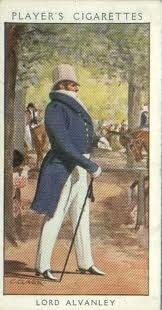
The following letter was written by the Hon. Katherine Arden*, daughter of the first Lord Alvanley (Richard, 1744-1804) and published in the Cornhill Magazine in 1891. With her mother and sister, she was resident in Brussels at the time of the great battle, and took an active part in nursing the wounded. The letter is addressed to her aunt, Miss Bootle Wilbraham, afterwards, Mrs. Barnes. It is franked from Windsor to Ormskirk in Lancashire by Miss Arden’s uncle, Mr. E. Bootle Wilbraham (afterwards Lord Skelmersdale), July 17, 1815.
*Sister of William Arden, 2nd Lord Alvaney (1789-1849) , famous dandy who squandered his fortune and died unmarried; the title went to their younger brother.
Brussels, Sunday 9th (July)
My Dearest Aunt, I can assure you most truly that I did not require reminding, to fulfill the promise I made you of writing, and every day since our return from Antwerp I have settled for the purpose, but what with visiting the sick, and making bandages and lint, I can assure you my time has been pretty well occupied. As my patients are, thank goodness, most of them now convalescent, I think the best way I can reward my dear Aunt’s patience, is by giving her a long account of our hopes, fears, and feelings from the time the troops were ordered to march down to the present moment. (If you are tired with my long account, remember you expressed a wish in Mama’s letter to hear all our proceedings.)
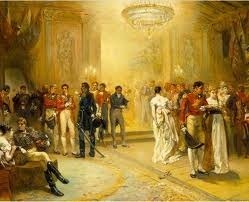
On Thursday the 15th of June, we went to the great ball that the Duchess of Richmond gave, and which we expected to see from Generals down to Ensigns, all the military men, who with their regiments had been for some time quartered from 18 to 30 miles from this town, and consequently so much nearer the frontiers; nor were we disappointed, with the exception of 3 generals, every officer high in the army was to be there seen.
Though for nearly ten weeks we had been daily expecting the arrival of the French troops on the Frontiers, and had rather been wondering at their delay, yet when on our arrival at the ball, we were told that the troops had ordered to march at 3 in the morning, and that every officer must join his regiment by that time, as the French were advancing, you cannot possibly picture to yourself the dismay and consternation that appeared in every face.
Those who had brothers and sons to be engaged, openly gave way to their grief, as the last parting of many took place at this most terrible ball; others (and thank Heaven ranked amongst that number, for in the midst of my greatest fears, I still felt thankfulness, was my prominent feeling that my beloved Dick (her brother) was not here), who had no near relation, yet felt that amongst the many many friends we all had there, it was impossible that all should escape, and that the next time we might hear of them, they might be numbered with the dead; in fact, my dear Aunt, I cannot describe to you my mingled feelings, you will, however, I am sure, understand them, and I feel quite inadequate to express them.
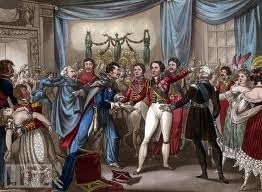
We staid at the ball as short a time as we could but long enough to see express after express arrive to the Duke of Wellington, to hear of Aides de Camp arriving breathless with news, and to see, what was much more extraordiniary than all, the Duke’s equanimity a little discomposed. We took a mournful farewell of some of our best friends, and returned home to anything but repose.
The morning (Friday June 16) dawned most lovelily, and before seven o’clock we had seen 12,000 Brunswickers, Scotch, and English pass before our windows, of whom one third before night were mingled with the dust. Mama took a farewell of the Duke as he passed by, but Fanny and myself, at last wearied out, had before he went, retired to bed. The first person that we saw in the morning brought us the news, that the advanced guard of the French had in the night come on as far as Genappe, 18 miles off, and had had several skirmishes with the Prussians.
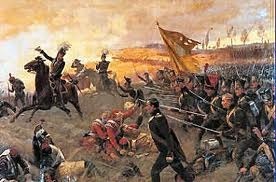
This intelligence, as you may suppose, did not tend to compose us, but still everything went on in quiet calmness, when (Gracious heavens, never never shall I forget it), at three o’clock a loud cannonading commenced, which upon the ramparts was heard nearly as plain as we do the Tower guns in London; it went on without intermission till 8 o’clock, when it was thought to appear more distant, and therefore hopes were entertained that the French had retreated; nothing certain was known, but it was reported that the Prussians had been principally attacked, and were rather giving way when the Highlanders and the regiments who had marched from here in the morning joined them, and compleately repulsed the French.
So far the news was good, but still the English had fought, and what our loss was, nobody knew; however, we bore up pretty well till above twelve o’clock, a gentleman (Mr. Leigh, of Lyme in Cheshire) came from off the field of battle, where he had been looking on, with the intelligence that there had been a dreadful battle, the Duke of Brunswick was killed, and that the Brigade of 1st Guards and the Highlanders were literally cut to pieces. I will not attempt to say what we felt, for it would be quite vain.
I must only tell you that that Regiment of Guards contained all our greatest friends, independent of our having to regret them as Englishmen. The next morning by six o’clock, Saturday 17th numbers of Belgians and others of our brave Allies came flying into the town, with the report that the French were at their heels, but this intelligence occasioned but a temporary fright, as a bulletin was published officially saying that we had gained a great victory, and the French were retreating (neither of which was true). About ten o’clock the real horrors of war began to appear, and though we were spared hearing cannonading, yet the sights that we saw were infinitely more frightful than anything we had heard the day before. I mean the sight of wounded. I must tell you before I proceed, that Sir James Gambier (the Consul General to the Paysbas, who is the best man that ever was) came to us about eight o’clock, and told us that there really had been a severe engagement, but that we had the advantage, that though the Guards had suffered most dreadfully, yet that their loss was not quite so great as had been reported, but that the Highlanders were literally nearly annihilated, after having performed prodigies of valor; and very good proof had we how dreadfully they had suffered, by the numbers who were brought in here, literally cut to pieces. Our house being unfortunately near the gate where they were brought in, most of them passed our door; their wounds were none of them drest, and barely bound up, the wagons were piled up to a degree almost incredible, and numbers for whom there was no room, were obliged, faint and bleeding, to follow on foot; their heads being what had most suffered, having been engaged with cavalry, were often so much bound up, that they were unable to see, and therefore held by the wagons in order to know their road. Everybody, as you may suppose, pressed forward, anxious to be of some service to the poor wounded Hero’s but the people had orders that those who could go on should proceed to Antwerp, to make room for those who were to follow (dreadful idea), and therefore we could be of no further use to them than giving them refreshments as they passed.
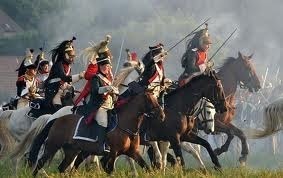
In the middle of the day, we heard further particulars of the last night’s battle, and if all danger had been removed far from us, which Heaven knows was very far from being so, we still should have felt nervous at the danger that had nearly befallen us. Conceive it having been run so near, that the French were within ten minutes of getting possession of the road to Brussels, which had they once gained, in all probability they would have reached the town in three hours.
Providence, however, ordered it otherwise, and the Guards, who had marched from Enghien 27 miles off, arrived at the lucky moment, and got possession of the road. They were shortly afterwards joined by the Highlanders, who some of them fought with their knapsacks on, having marched 20 miles and accordingly were enabled to keep their ground against the French.
The conduct of the English soldiers on that day was perfect, and would have been sufficient to have immortalized them, without the addition of the Sunday’s battle, after which the Duke of Wellington said he should never feel sufficiently grateful to the Guards for their conduct on both days, which from the Duke means more than it would from anybody else.
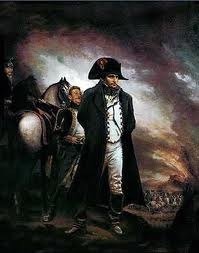
Our Hero, Wellington, who had been deceived with the intelligence given him (for it is said that Bony had bribed most of his outposts), and had no idea that the French were so near, nor advancing in such force, was so distressed when he discovered the truth, that as usual totally regardless of his personal safety, he was exposing himself in the most dreadful way (I am speaking of the Friday’s business at Quatre Bras, so named from four roads meeting), and already a party of French horse, having marked him out, were rushing on him with the greatest violence, when the Highlanders, who saw his danger, and it is said he never was in so great before, rushed between him and the French, and with the lives of hundreds, saved his still more precious one. On coming off the field, the Duke told some whom he met with, that their conduct had been noble and he should make a good report of them; of the 92nd regiment, out of seven hundred men, but one hundred and fifty remain to share the glory.
But to resume my narrative. We remained the whole of Saturday, in great suspense, to know that the armies were about, and whether the French were really retreating as had been reported; about four o’clock in the day, we were dreadfully undeceived, by being told from very good authority that instead of the enemy it was Lord Wellington who had retreated, and who with his whole army were within ten miles of the town; the reason given for his doing so, was that the Prussians had been attacked on the Friday evening whilst they were quietly cooking, and that having lost a tremendous number of men, Blucher had judged it prudent to retire, which being the case, he had left Lord Wellington’s left flank so exposed, that it was impossible for him to remain where he was, and that he had therefore retreated to a strong position near Waterloo, whilst our cavalry were engaged in playing before them, to hide, as much as possible, their retreat from the French.
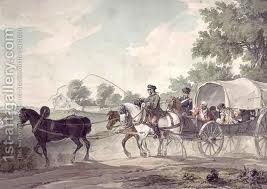 copyright 1st Artgallery.com
copyright 1st Artgallery.com
It was likewise added, that it was to be hoped that the Prussians would rejoin the English, as at that present time, the armies were near nine miles asunder, and that orders had been issued by the Duke for all baggage to be sent from the army through this town, and for the wounded, if possible, to be moved from it. All this looked so like retreating on the town, that we were told we must have horses ready, and everything prepared to go at an instant’s notice, which accordingly we commenced doing, and from that hour 4 o’clock till eight in the morning (Sunday June 18) when we were fairly in Antwerp, were, I hope, the most harassing 16 hours I ever passed, or ever shall.
From that time the baggage wagons passed in such quick succession, that they formed cavalcades through the town, as not only those who were ordered to go, but those who desired to stay with the army, passed through, a general panic having seized all the officers’ servants, by which means many have lost all they had, and everybody is minus something.
About every half-hour a man was heard scampering down the street calling out that the French were coming; some, indeed said they were at the gates, and though we knew that that could not be true, yet it was impossible to know how much foundation there was for saying so. About seven o’clock (Saturday June 17) our friend Sir James Gambier arrived to say that he hoped our things were nearly packed up, as though it was not necessary to go immediately, yet that he begged our things might be put to the carriage as we might be obliged to start at an instant’s notice, for it was known that the Prussians were not joined, and if Buonaparte were to attack that night, there was no knowing what the event might be. (We have since heard, that if he had done so, the tide of affairs would in all probability have turned completely for him instead of being as it is now).
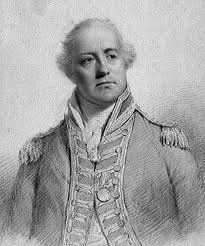 James Gambier, First Baron Gambier
James Gambier, First Baron Gambier
(1756–1833).
After Sir James went, we went out to see what our friends intended doing; we found that some were gone, others going, and all were prepared for the worst. We accordingly agreed, that at the time Lady Charlotte Greville went, we would accompany her, as everybody told us if we waited for the worst we could never get away; and as we knew for certain that Buonaparte had promised his soldiers after he had drawn 20,000,000 francs from the town, that they should have three days pillage of it, which, as the enraged French soldiery are not the most kind hearted possible, and as the English could expect no mercy for them, we though it madness to put ourselves in such danger, and accordingly everything was got ready. To increase the horror and noise, about ten o’clock, a most horrible storm of wind and rain came on, which lasted without intermission till three o’clock, when the wind abated, but the rain continued at intervals, the whole of Sunday, to which the whole of our poor soldiers were exposed with the additional hardship of having very little to eat, as they had been so continually changing their place for the last two days, that the officers have since told us, that for nearly eight and forty hours, they had barely two pounds of bread to eat; luckily, the Sunday morning, after the dreadful night they passed, the common men had a double supply of spirits, which enabled them to fight as they did.
The baggage wagons and fuyards [fugitives] continued passing, without intermission, and what with being deafened with the noise, and worn out with anxiety, we were in a terrible state of fatigue, when at half past two (Sunday the 18th) Lady Charlotte sent to say the Mayor of the town had sent to advise all the English to quit the town, and that she was waiting for us. We accordingly joined her, and though we were very much impeded by the road being blocked up with wagons in which were numbers of the wounded, lying exposed to all the inclemency of the weather, and were several times in danger of being overturned, yet providentially we arrived safe at Antwerp about eight o’clock (Note: The distance from Brussels to Antwerp by road is about twenty-seven miles). We found the greatest difficulty in getting a hole to put our heads in, but at last succeeded: Lady Charlotte proceeded on the Hague immediately, but we remained to wait the event. We were told by many people that the rain would prevent them fighting, which gave us ease for the time, and though we spent the day in great suspense, yet we were saved the dreadful indescribable anxiety of those who remained here; never can I be sufficiently thankful that we left this place. For the first time for three nights, Fanny and myself were enabled to sleep, and the next morning, Monday (the 19th) we were awoke, with the delightful news, that a decisive victory had been obtained, and that the French were retreating in disorder. The account of killed and wounded which we then heard made us shudder; how much more dreadful was it, when the whole list was made out! There are 724 English officers killed and wounded, and nearly 11,000 common men, without Hanoverians.
The conduct of the English infantry in the battle of Sunday was something so extraordinary, that Cambaceres, Buonaparte’s A.D.C. who was taken, said Buonaparte himself had said that it was useless to fight against such troops, nothing could make them give way. They were formed into hollow squares, upon which the French cavalry, particularly the Cuirassiers, who wear complete armour, poured down, but without any avail, not one of their squares were ever broken, though perhaps from being six or eight lines deep, they came at last to only one.
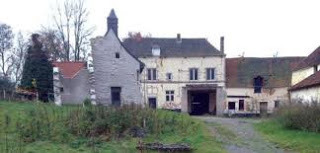 Hougemont
Hougemont
There is a little wood and a farm-house in the midst of the field of battle, which is called Hougemont, and which it was necessary for the English to maintain possession of: 500 of the Guards under Lord Saltoun and Co. Macdonnell were put into it, to defend it, and though they were attacked by above 10,000 French, and the Farm-house was set fire to, and burnt to the ground, yet our Invincible countrymen still maintained possession of it, and finally repulsed the enemy. Do not you feel, while you hear these accounts, that your national pride increases every instant, and that you feel more thankful than ever that you are English born and bred? I have that sort of enthusiasm about me, that I almost feel inclined to shake hands with every soldier I meet walking in the streets. The light cavalry, I am sorry to say, for the first time in their lives, did not behave like Englishmen; the 7th Hussars and 23rd dragoons refused to advance when they were ordered, and poor Lord Uxbridge, who is as brave as a lion, and doats upon his regiment (the 7th) went up to Lord Wellington in the midst of the engagement, and said in the bitterness of his heart, My cavalry have deserted me! The heavy dragoons behaved admirably, and the horse Guards and Blue’s who though they have been in Spain, were never before personally engaged, performed prodigies.—The Duke of Wellington has since said, that he never exerted himself in his life as he did on that day, but that notwithstanding, the battle was lost three times; he exposed himself in every part of the line, often threw himself into the squares when they were about to be attacked, and did what it is said he never had done before, talked to the soldiers, and told them to stand firm; in fact, I believe without his having behaved as he did, the English would never have stood their ground so long, till the arrival of 30,000 fresh Prussians under Bulow finished the day, for as soon as the French saw them, they ran.
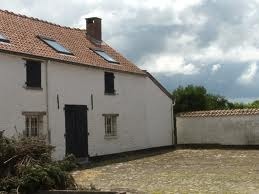 La Belle Alliance
La Belle Alliance
The conduct of the French cavalry is represented as having been most beautiful, and nothing could have withstood them but our soldiers. The day after the battle, when the Duke had leisure to consider the loss he had sustained in both officers and men, he was most deeply affected, and Mrs. Pole, who breakfasted with him said the tears were running down upon his plate the whole time. How much more noble the Hero appears when possessed of so much feeling!
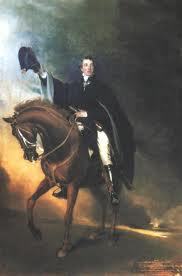
You ask how we like the Duke, and whether he is haughty? To men, I believe he is, very often, but all his personal staff are extremely attached to him, and towards women his manners excessively agreeable and very gallant; we like him vastly. We went a few days since to see the field of battle, and everything offensive was removed, a most interesting visit; we went with an A.D.C. of Gen. Cooke, (who poor man, the General, has lost his arm), and who explained to us all about the battle.—I am quite ashamed, my dear Aunt, to think how much I have written; pray forgive me.

The following letter was written by the Hon. Katherine Arden*, daughter of the first Lord Alvanley (Richard, 1744-1804) and published in the Cornhill Magazine in 1891. With her mother and sister, she was resident in Brussels at the time of the great battle, and took an active part in nursing the wounded. The letter is addressed to her aunt, Miss Bootle Wilbraham, afterwards, Mrs. Barnes. It is franked from Windsor to Ormskirk in Lancashire by Miss Arden’s uncle, Mr. E. Bootle Wilbraham (afterwards Lord Skelmersdale), July 17, 1815.
*Sister of William Arden, 2nd Lord Alvaney (1789-1849) , famous dandy who squandered his fortune and died unmarried; the title went to their younger brother.
Brussels, Sunday 9th (July)
My Dearest Aunt, I can assure you most truly that I did not require reminding, to fulfill the promise I made you of writing, and every day since our return from Antwerp I have settled for the purpose, but what with visiting the sick, and making bandages and lint, I can assure you my time has been pretty well occupied. As my patients are, thank goodness, most of them now convalescent, I think the best way I can reward my dear Aunt’s patience, is by giving her a long account of our hopes, fears, and feelings from the time the troops were ordered to march down to the present moment. (If you are tired with my long account, remember you expressed a wish in Mama’s letter to hear all our proceedings.)

On Thursday the 15th of June, we went to the great ball that the Duchess of Richmond gave, and which we expected to see from Generals down to Ensigns, all the military men, who with their regiments had been for some time quartered from 18 to 30 miles from this town, and consequently so much nearer the frontiers; nor were we disappointed, with the exception of 3 generals, every officer high in the army was to be there seen.
Though for nearly ten weeks we had been daily expecting the arrival of the French troops on the Frontiers, and had rather been wondering at their delay, yet when on our arrival at the ball, we were told that the troops had ordered to march at 3 in the morning, and that every officer must join his regiment by that time, as the French were advancing, you cannot possibly picture to yourself the dismay and consternation that appeared in every face.
Those who had brothers and sons to be engaged, openly gave way to their grief, as the last parting of many took place at this most terrible ball; others (and thank Heaven ranked amongst that number, for in the midst of my greatest fears, I still felt thankfulness, was my prominent feeling that my beloved Dick (her brother) was not here), who had no near relation, yet felt that amongst the many many friends we all had there, it was impossible that all should escape, and that the next time we might hear of them, they might be numbered with the dead; in fact, my dear Aunt, I cannot describe to you my mingled feelings, you will, however, I am sure, understand them, and I feel quite inadequate to express them.

We staid at the ball as short a time as we could but long enough to see express after express arrive to the Duke of Wellington, to hear of Aides de Camp arriving breathless with news, and to see, what was much more extraordiniary than all, the Duke’s equanimity a little discomposed. We took a mournful farewell of some of our best friends, and returned home to anything but repose.
The morning (Friday June 16) dawned most lovelily, and before seven o’clock we had seen 12,000 Brunswickers, Scotch, and English pass before our windows, of whom one third before night were mingled with the dust. Mama took a farewell of the Duke as he passed by, but Fanny and myself, at last wearied out, had before he went, retired to bed. The first person that we saw in the morning brought us the news, that the advanced guard of the French had in the night come on as far as Genappe, 18 miles off, and had had several skirmishes with the Prussians.

This intelligence, as you may suppose, did not tend to compose us, but still everything went on in quiet calmness, when (Gracious heavens, never never shall I forget it), at three o’clock a loud cannonading commenced, which upon the ramparts was heard nearly as plain as we do the Tower guns in London; it went on without intermission till 8 o’clock, when it was thought to appear more distant, and therefore hopes were entertained that the French had retreated; nothing certain was known, but it was reported that the Prussians had been principally attacked, and were rather giving way when the Highlanders and the regiments who had marched from here in the morning joined them, and compleately repulsed the French.
So far the news was good, but still the English had fought, and what our loss was, nobody knew; however, we bore up pretty well till above twelve o’clock, a gentleman (Mr. Leigh, of Lyme in Cheshire) came from off the field of battle, where he had been looking on, with the intelligence that there had been a dreadful battle, the Duke of Brunswick was killed, and that the Brigade of 1st Guards and the Highlanders were literally cut to pieces. I will not attempt to say what we felt, for it would be quite vain.
I must only tell you that that Regiment of Guards contained all our greatest friends, independent of our having to regret them as Englishmen. The next morning by six o’clock, Saturday 17th numbers of Belgians and others of our brave Allies came flying into the town, with the report that the French were at their heels, but this intelligence occasioned but a temporary fright, as a bulletin was published officially saying that we had gained a great victory, and the French were retreating (neither of which was true). About ten o’clock the real horrors of war began to appear, and though we were spared hearing cannonading, yet the sights that we saw were infinitely more frightful than anything we had heard the day before. I mean the sight of wounded. I must tell you before I proceed, that Sir James Gambier (the Consul General to the Paysbas, who is the best man that ever was) came to us about eight o’clock, and told us that there really had been a severe engagement, but that we had the advantage, that though the Guards had suffered most dreadfully, yet that their loss was not quite so great as had been reported, but that the Highlanders were literally nearly annihilated, after having performed prodigies of valor; and very good proof had we how dreadfully they had suffered, by the numbers who were brought in here, literally cut to pieces. Our house being unfortunately near the gate where they were brought in, most of them passed our door; their wounds were none of them drest, and barely bound up, the wagons were piled up to a degree almost incredible, and numbers for whom there was no room, were obliged, faint and bleeding, to follow on foot; their heads being what had most suffered, having been engaged with cavalry, were often so much bound up, that they were unable to see, and therefore held by the wagons in order to know their road. Everybody, as you may suppose, pressed forward, anxious to be of some service to the poor wounded Hero’s but the people had orders that those who could go on should proceed to Antwerp, to make room for those who were to follow (dreadful idea), and therefore we could be of no further use to them than giving them refreshments as they passed.

In the middle of the day, we heard further particulars of the last night’s battle, and if all danger had been removed far from us, which Heaven knows was very far from being so, we still should have felt nervous at the danger that had nearly befallen us. Conceive it having been run so near, that the French were within ten minutes of getting possession of the road to Brussels, which had they once gained, in all probability they would have reached the town in three hours.
Providence, however, ordered it otherwise, and the Guards, who had marched from Enghien 27 miles off, arrived at the lucky moment, and got possession of the road. They were shortly afterwards joined by the Highlanders, who some of them fought with their knapsacks on, having marched 20 miles and accordingly were enabled to keep their ground against the French.
The conduct of the English soldiers on that day was perfect, and would have been sufficient to have immortalized them, without the addition of the Sunday’s battle, after which the Duke of Wellington said he should never feel sufficiently grateful to the Guards for their conduct on both days, which from the Duke means more than it would from anybody else.

Our Hero, Wellington, who had been deceived with the intelligence given him (for it is said that Bony had bribed most of his outposts), and had no idea that the French were so near, nor advancing in such force, was so distressed when he discovered the truth, that as usual totally regardless of his personal safety, he was exposing himself in the most dreadful way (I am speaking of the Friday’s business at Quatre Bras, so named from four roads meeting), and already a party of French horse, having marked him out, were rushing on him with the greatest violence, when the Highlanders, who saw his danger, and it is said he never was in so great before, rushed between him and the French, and with the lives of hundreds, saved his still more precious one. On coming off the field, the Duke told some whom he met with, that their conduct had been noble and he should make a good report of them; of the 92nd regiment, out of seven hundred men, but one hundred and fifty remain to share the glory.
But to resume my narrative. We remained the whole of Saturday, in great suspense, to know that the armies were about, and whether the French were really retreating as had been reported; about four o’clock in the day, we were dreadfully undeceived, by being told from very good authority that instead of the enemy it was Lord Wellington who had retreated, and who with his whole army were within ten miles of the town; the reason given for his doing so, was that the Prussians had been attacked on the Friday evening whilst they were quietly cooking, and that having lost a tremendous number of men, Blucher had judged it prudent to retire, which being the case, he had left Lord Wellington’s left flank so exposed, that it was impossible for him to remain where he was, and that he had therefore retreated to a strong position near Waterloo, whilst our cavalry were engaged in playing before them, to hide, as much as possible, their retreat from the French.
 copyright 1st Artgallery.com
copyright 1st Artgallery.comIt was likewise added, that it was to be hoped that the Prussians would rejoin the English, as at that present time, the armies were near nine miles asunder, and that orders had been issued by the Duke for all baggage to be sent from the army through this town, and for the wounded, if possible, to be moved from it. All this looked so like retreating on the town, that we were told we must have horses ready, and everything prepared to go at an instant’s notice, which accordingly we commenced doing, and from that hour 4 o’clock till eight in the morning (Sunday June 18) when we were fairly in Antwerp, were, I hope, the most harassing 16 hours I ever passed, or ever shall.
From that time the baggage wagons passed in such quick succession, that they formed cavalcades through the town, as not only those who were ordered to go, but those who desired to stay with the army, passed through, a general panic having seized all the officers’ servants, by which means many have lost all they had, and everybody is minus something.
About every half-hour a man was heard scampering down the street calling out that the French were coming; some, indeed said they were at the gates, and though we knew that that could not be true, yet it was impossible to know how much foundation there was for saying so. About seven o’clock (Saturday June 17) our friend Sir James Gambier arrived to say that he hoped our things were nearly packed up, as though it was not necessary to go immediately, yet that he begged our things might be put to the carriage as we might be obliged to start at an instant’s notice, for it was known that the Prussians were not joined, and if Buonaparte were to attack that night, there was no knowing what the event might be. (We have since heard, that if he had done so, the tide of affairs would in all probability have turned completely for him instead of being as it is now).
 James Gambier, First Baron Gambier
James Gambier, First Baron Gambier (1756–1833).
After Sir James went, we went out to see what our friends intended doing; we found that some were gone, others going, and all were prepared for the worst. We accordingly agreed, that at the time Lady Charlotte Greville went, we would accompany her, as everybody told us if we waited for the worst we could never get away; and as we knew for certain that Buonaparte had promised his soldiers after he had drawn 20,000,000 francs from the town, that they should have three days pillage of it, which, as the enraged French soldiery are not the most kind hearted possible, and as the English could expect no mercy for them, we though it madness to put ourselves in such danger, and accordingly everything was got ready. To increase the horror and noise, about ten o’clock, a most horrible storm of wind and rain came on, which lasted without intermission till three o’clock, when the wind abated, but the rain continued at intervals, the whole of Sunday, to which the whole of our poor soldiers were exposed with the additional hardship of having very little to eat, as they had been so continually changing their place for the last two days, that the officers have since told us, that for nearly eight and forty hours, they had barely two pounds of bread to eat; luckily, the Sunday morning, after the dreadful night they passed, the common men had a double supply of spirits, which enabled them to fight as they did.
The baggage wagons and fuyards [fugitives] continued passing, without intermission, and what with being deafened with the noise, and worn out with anxiety, we were in a terrible state of fatigue, when at half past two (Sunday the 18th) Lady Charlotte sent to say the Mayor of the town had sent to advise all the English to quit the town, and that she was waiting for us. We accordingly joined her, and though we were very much impeded by the road being blocked up with wagons in which were numbers of the wounded, lying exposed to all the inclemency of the weather, and were several times in danger of being overturned, yet providentially we arrived safe at Antwerp about eight o’clock (Note: The distance from Brussels to Antwerp by road is about twenty-seven miles). We found the greatest difficulty in getting a hole to put our heads in, but at last succeeded: Lady Charlotte proceeded on the Hague immediately, but we remained to wait the event. We were told by many people that the rain would prevent them fighting, which gave us ease for the time, and though we spent the day in great suspense, yet we were saved the dreadful indescribable anxiety of those who remained here; never can I be sufficiently thankful that we left this place. For the first time for three nights, Fanny and myself were enabled to sleep, and the next morning, Monday (the 19th) we were awoke, with the delightful news, that a decisive victory had been obtained, and that the French were retreating in disorder. The account of killed and wounded which we then heard made us shudder; how much more dreadful was it, when the whole list was made out! There are 724 English officers killed and wounded, and nearly 11,000 common men, without Hanoverians.
The conduct of the English infantry in the battle of Sunday was something so extraordinary, that Cambaceres, Buonaparte’s A.D.C. who was taken, said Buonaparte himself had said that it was useless to fight against such troops, nothing could make them give way. They were formed into hollow squares, upon which the French cavalry, particularly the Cuirassiers, who wear complete armour, poured down, but without any avail, not one of their squares were ever broken, though perhaps from being six or eight lines deep, they came at last to only one.
 Hougemont
HougemontThere is a little wood and a farm-house in the midst of the field of battle, which is called Hougemont, and which it was necessary for the English to maintain possession of: 500 of the Guards under Lord Saltoun and Co. Macdonnell were put into it, to defend it, and though they were attacked by above 10,000 French, and the Farm-house was set fire to, and burnt to the ground, yet our Invincible countrymen still maintained possession of it, and finally repulsed the enemy. Do not you feel, while you hear these accounts, that your national pride increases every instant, and that you feel more thankful than ever that you are English born and bred? I have that sort of enthusiasm about me, that I almost feel inclined to shake hands with every soldier I meet walking in the streets. The light cavalry, I am sorry to say, for the first time in their lives, did not behave like Englishmen; the 7th Hussars and 23rd dragoons refused to advance when they were ordered, and poor Lord Uxbridge, who is as brave as a lion, and doats upon his regiment (the 7th) went up to Lord Wellington in the midst of the engagement, and said in the bitterness of his heart, My cavalry have deserted me! The heavy dragoons behaved admirably, and the horse Guards and Blue’s who though they have been in Spain, were never before personally engaged, performed prodigies.—The Duke of Wellington has since said, that he never exerted himself in his life as he did on that day, but that notwithstanding, the battle was lost three times; he exposed himself in every part of the line, often threw himself into the squares when they were about to be attacked, and did what it is said he never had done before, talked to the soldiers, and told them to stand firm; in fact, I believe without his having behaved as he did, the English would never have stood their ground so long, till the arrival of 30,000 fresh Prussians under Bulow finished the day, for as soon as the French saw them, they ran.
 La Belle Alliance
La Belle AllianceThe conduct of the French cavalry is represented as having been most beautiful, and nothing could have withstood them but our soldiers. The day after the battle, when the Duke had leisure to consider the loss he had sustained in both officers and men, he was most deeply affected, and Mrs. Pole, who breakfasted with him said the tears were running down upon his plate the whole time. How much more noble the Hero appears when possessed of so much feeling!

You ask how we like the Duke, and whether he is haughty? To men, I believe he is, very often, but all his personal staff are extremely attached to him, and towards women his manners excessively agreeable and very gallant; we like him vastly. We went a few days since to see the field of battle, and everything offensive was removed, a most interesting visit; we went with an A.D.C. of Gen. Cooke, (who poor man, the General, has lost his arm), and who explained to us all about the battle.—I am quite ashamed, my dear Aunt, to think how much I have written; pray forgive me.
Published on June 19, 2015 00:44
Kristine Hughes's Blog
- Kristine Hughes's profile
- 6 followers
Kristine Hughes isn't a Goodreads Author
(yet),
but they
do have a blog,
so here are some recent posts imported from
their feed.



